 24/06/2010 00:30 24/06/2010 00:30 |
|
| | | OFFLINE | Post: 304
Post: 61 | Registrato il: 28/05/2007
Registrato il: 19/02/2009 | Utente Comunità | Utente Junior | |
|
Crotchet: yes, you’re right, I am a convert. I was a member of the main Protestant/ Lutheran church of Germany until Easter 2008.
I assume everybody has quite a story to tell about their conversion.
In my case it was rather difficult to come to grips with it, because I have always been a loyal to the grave person. ‘Betraying’ the institution I was baptized and confirmed into by renouncing membership in our City Hall gave me the most horrible, sick feeling and did make me feel like a traitor of the worst kind!
Martin Luther is regarded a local hero in my home town. He spent some time hiding from the Pope’s henchmen in our fortress (quite an impressive structure – nearly 1.000 years old, only ever conquered by US planes and tanks at the end of WW2). He translated some of the bible there and left a famous ink stain on the wall of his study –by throwing a barrel of ink against the wall in frustration – the stain is still there and quite visible.
Our local Royalty shifted their loyalty from Rome to Luther and ever since our area is predominantly Protestant.
I have a great relationship with out protestant minister. I’ve drank with him during several New Years Eve parties, I’m on the familiar ‘Du’ with him, one of his four children went to class with our middle son, he is frank and open with me about his divorce and about the war he has been fighting with his ex ever since (also a minister – one of the biggest dragon women I have ever met).
When I met him last year at our Parish fest (Catholic) he rushed over and exclaimed: “Oh thank God you’ve only converted! When I saw your renunciation letter, I thought we had lost you!!”
I told him some of the reasons: Holy Communion, the sacraments in general, the emotional dimension it adds to the rational dimension, the beauty, the refusal to yield to the ever destructive Zeitgeist. The fact that the Protestant church had turned into a social club, only concerned about worldly matters... and, and, and…
And then he said: “Well, the differences aren’t all so big, if only Rome would go along with the course of the local clergy, we would have much more unity and many more common services.”
Now that describes the situation in Germany perfectly. You have a Pope in far away Rome, who preached this, that and the other thing. Then you have a Bishop who might not really agree with all of that, and, because of that, you have Priests who are allowed to teach their own theology, use their self-crafted rubrics and, who are allowed to actively attack the Pope from their pulpits.
Then you have an active lay council who needs/wants/must be involved in everything! Many parish councils nowadays believe that they are on the same level as the Priest. In every single regard! And nobody is stopping them! If the Priest attempts, he is mercilessly mobbed out with every means possible.
The problem with the Protestants is: they don’t see/understand/comprehend/are not interested in the difference! Not in the slightest bit!!
To them, Catholics are some type of weird relics from the past without possessing any rationality (very important in Germany); with extremely strange customs and some type of dictatorship-hierarchy-> a big no-no!!
Germans don’t trust things they can’t rationalize, so they have succeeded into rationalizing and reducing the Lutheran version / vision of the church into a cold, bloodless, sleek, Teflon-like, well organized, club of soft-washed, tolerant, as-long-as-it-makes-you-happy, kumbajah folks.
But they have also maneuvered their church into irrelevance. Many Protestants in responsible positions don’t even deny that their idea of church is a democratic institution responsible for fighting climate change, intolerance, unfair government decisions, and many other socio-political matters. But they don’t see how much they’re ignored.
Fine, the Catholic Church is ignored as well, but at least their main focus in Christ!
Sorry… I really could write pages upon pages about all this. I’ve been so emotionally charged in the past three months, due to all those attacks on the Holy Father and the Church and now this ….
As much as I respect Mons. Mixa for finally stepping down for good, I do wonder who is going to be the next victim of the protestant/media/schismatic Catholics witch hunt. They won’t dare attacking Card. Meisner. He’s too strong. Mons. Müller is fearless, as well.
The next weeks will be interesting….
This is a link to the main page of the Evangelische Kirche in Deutschland (EKD).
www.ekd.de/
There you have it. The main event seems to be to talk 'Rome' into approving the famous common 'Abendmahl'. Again this topic is aggressivly pushed, without even the slightest regard to the Catholic meaning of the Eucharist!!
www.ekd.de/aktuell_presse/news_2010_06_23_3_abendmahl_dekt_dres...[Modificato da cowgirl2 24/06/2010 00:38] |
| |
|
| |
 24/06/2010 04:49 24/06/2010 04:49 |
|
| | | OFFLINE | | Post: 20.447
Post: 3.085 | Registrato il: 28/08/2005
Registrato il: 20/01/2009 | Administratore | Utente Master | |
|


 I didn't get to translate the Holy Father's catechesis till just now, so I'm re-posting it on this page as well, with the news agency photos of the GA:
GENERAL AUDIENCE ON 6/23:
I didn't get to translate the Holy Father's catechesis till just now, so I'm re-posting it on this page as well, with the news agency photos of the GA:
GENERAL AUDIENCE ON 6/23:
Final Catechesis on St. Thomas Aquinas
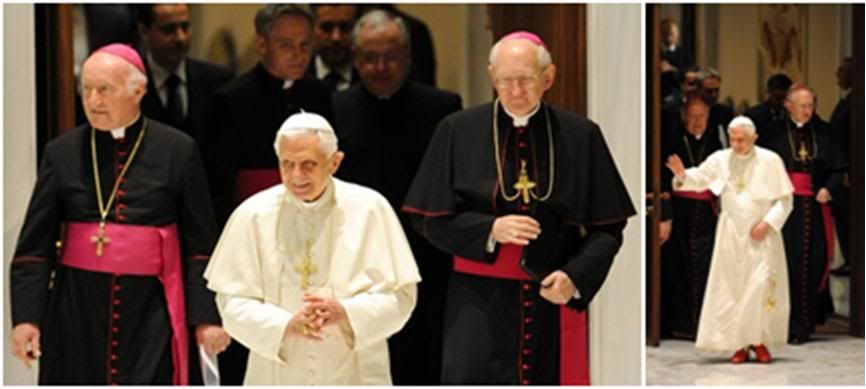
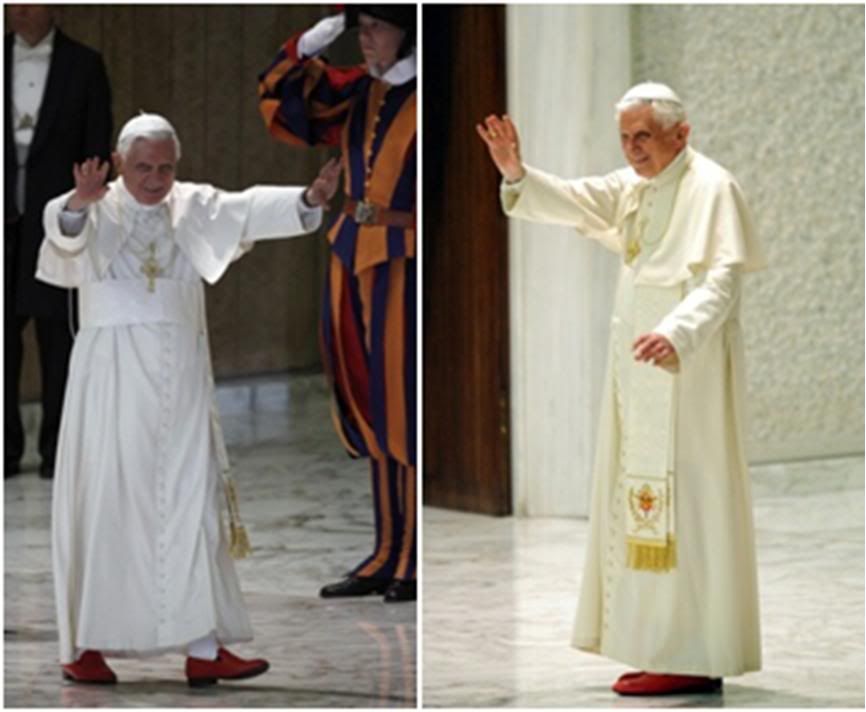
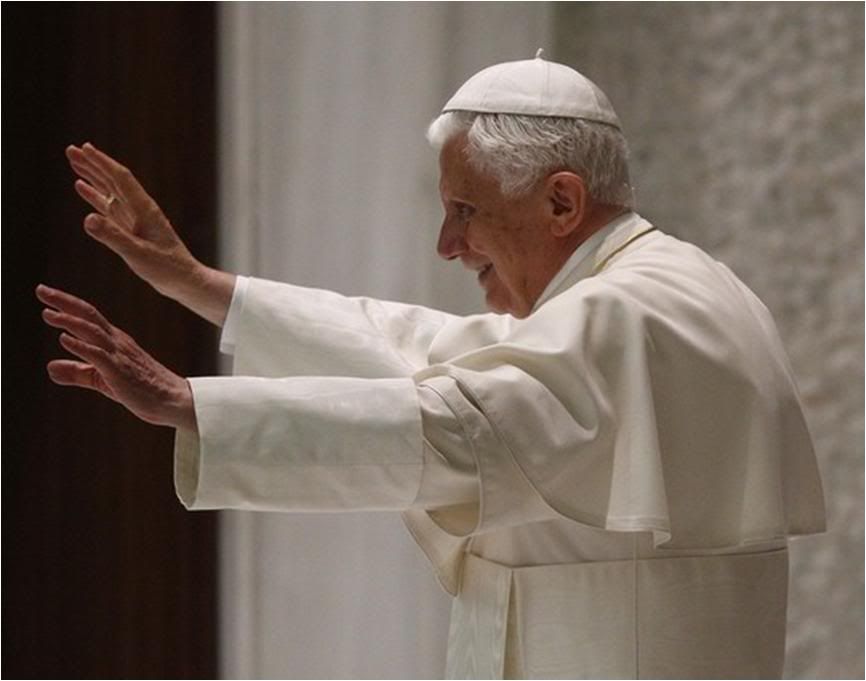
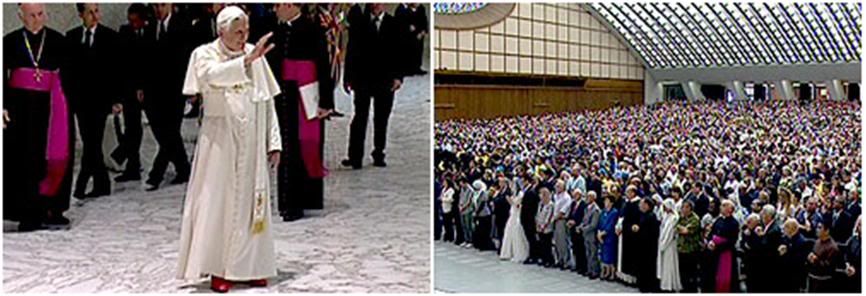
Here is a full translation of the Pope's catechesis:
Dear brothers and sisters,
Today I wish to complete, with a third installment, my catecheses on St. Thomas Aquinas. Even more than 700 years after his death, we can learn a lot from him. This was recalled by my predecessor Paul VI who siad, in an address in Fossanova in September 1974, on the seventh centenary of Thomas's death, asked, "Master Thomas, what lesson can you give us?"
His answer: "Confidence in the truth of Catholic religious thought, such as hedefended, explained and opened to the cognitive capacity of the human mind" (Teacnings of Paul VI, XII, 1974, pp 833-834).
On the same day, in Aquino, still referrring to St. Thomas, he said: "All of us, insofar as we are faithful children of the Church, can and should, at least in some measure, be his disciples" (idbid., p. 834).
Let us therefore place ourselves in the school of St. Thomas and his masterwork, the Summa Theologiae. It was unfinished but nonetheless, it is a monumental work, containing 512 questions and 2,669 articles.
Tightly argued, human reason is applied to the mysteries of the faith with clarity and depth, in questions and answers, whereby St. Thomas deepens the teaching that comes from Sacred Scripture and the Fathers of the Church, above all from St. Augustine.
In these reflections about the true questions of his time - which are often our own questions - St. Thomas, using the method and thinking of ancient philosophers, especially Aristotle, arrives at precise, lucid and pertinent formulations of the truths of the faith, where truth is a gift of faith, it shines and becomes accessible to us, for our own reflection.
But this effort of the human mind - As Aquinas reminds us with his own life - is always illuminated by prayer, by the light that comes from above. Only he who lives with God and his mysteries can understand what they say.
In his 'summary of theology', St. Thomas starts from the fact that God exists in three different ways:
First, he exists in himself - he is the principle and end of all things, and all creatures proceed from him and depend on him.
Then, God is present through his Grace in the life and activities of the Christian, of the saints.
And finally, God is present in a very special way in the Person of Christ truly united with the man Jesus, and working through the sacraments that flow from his redemptive work.
That is why the structure of this monumental work (cfr. Jean-Pierre Torrell, La «Summa» di San Tommaso, Milano 2003, pp. 29-75) - a quest with a 'theological outlook' into the fulness of God (cfr. Summa Theologiae, Ia, q. 1, a. 7) - is articulated in three parts illustrated by the Doctor Communis himself with these words:
"The main purpose of sacred doctrine is to make God known, not only in himself, but insofar as he is the beginning and the end of all things, especially of the creature with reason. In exposing this doctrine, we shall first discuss God; then, the movement of his creatures towards God; and thirdly, Christ who, as a man, is our way to ascend to God" (Ibid., I, q. 2).
It is circular: God in himself, who goes out of himself and takes us by the hand, so that with Christ, we return to God, we are united with God, and God will be everything in everyone.
Thus the first part of Summa Theologiae is an inquiry on God in himself, on the mystery of the Trinity, and on God's creative activity.
We also find a profound reflection on the authentic reality of the human being insofar as he comes from the creative hands of God, fruit of his love. On the one hand, we are created, dependent beings - we do not come from ourselves. But on the other hand, we have true autonomy, in that we are not simply something apparent - as some Platonist philosophers maintain - but a reality willed by God as such, with value in ourselves.
In the second part, St. Thomas considers man, impelled by Grace, in his aspiration to know and love God in order to be happy in time and in eternity.
First of all, the author presents the theological principles of moral action, studying how, in man's free choice to do good things, reason, will and passions are integrated - to which are added the strength that God's grace gives through the virtues and gifts of the Holy Spirit, as well as with the help of moral law.
Thus, the human person is a dynamic being that seeks itself, that seeks to become itself, and seeks, in this sense, to do things that build it up, that make it truly human. And here, moral law comes in, with Grace and reason, will and passions.
On this basis, St. Thomas delineates the physiognomy of the man who lives according to the Spirit and who thus becomes an icon of God. Here, St. Thomas pauses to study the three theological virtues - faith, hope and charity - followed by an acute examination of more than 50 moral virtues organized around four cardinal virtues - prudence, justice, temperance and firmness. He ends with a reflection on the different vocations in the Church.
In the third part of the Summa, St. Thomas studies the Mystery of Christ - the Way and the Truth - through whom we can reach God the Father. In this section he writes pages that are near-unsurpassable on the Mystery of the Incarnation and the Passion of Jesus, adding an ample treatise on the seven Sacraments, by which the divine Word incarnate extends the benefits of the Incarnation for our salvation, for our journey of faith towards God and eternal life - it remains almost materially present in the realities of Creation, and thus touches us intimately.
Speaking of the Sacraments, St. Thomas dwells particularly on the Mystery of the Eucharist, for which he had a very great devotion, to the point that according to his earliest biographers, he used to lay his head on the Tabernacle, as though to hear the beating of the divine and human heart of Jesus.
In one of his works of commentary on Scripture, St.Thomas helps us to understand the excellence of the Sacrament of the Eucharist when he writes: "Since the Eucharist is the sacrament of the Passion of our Lord, it contains in itself Jesus Christ who suffered for us. Therefore all that which is the effect of the Passion of our Lord is also the effect of this sacrament, since it is no other than the application in us of the Passion of Christ" (In Ioannem, c.6, lect. 6, n. 963).
We can understand why St. Thomas and other saints have celebrated the Holy Mass shedding tears of compassion for the Lord who offers himself as a sacrifice for us, tears of joy and gratitude.
Dear brothers and sisters, in the school of the samints, let us be enamored of this Sacrament. Let us take part in Holy Mass in the spirit of contemplation, in order to obtain its spiritual fruits. Let us nourish ourselves with the Body and Blood of the Lord, so we may be incessantly fed by Divine Grace. Let us gladly and frequently devote ourselves, one on one, in the company of the Most Blessed Sacrament.
What St. Thomas illustrated with scientific rigor in his major theological works, as the Summa theologiae itself, he exposed the Summa contra Gentiles in his preaching, addressed to his students and to the faithful.
In 1273, one year before his death, during the entire Lent, he preached at the Church of San Domenico Maggiore in Naples. The contents of those sermons were assembled and conserved - these are the booklets in which he explains the symbol of the apostles, he interprets the 'Our Father', he illustrtes the Decalog (Ten Commandments) and comments on the 'Hail Mary'.
The contents of the preaching of the DoctorAngelicus corresponds almost completely to the structure of the Catechism of the Catholic Church. In fact, in catecheses and preaching, at a time like ours of a renewed commitment to evangelization, these fundamental arguments must never be missing: what we believe - that is the Symbol of the faith [an expression that refers to the Creed]; what we pray - the Our Father and the Hail Mary; what we live, as Biblical revelation teaches us - namely, the law to love God and our neigbor, and the Ten Commandments as an application of the commandment of love.
I wish to cite some examples of the simple, essential and persuavice content of St. Thomas's teaching. In his booklet on the Symbol of the Apostles, he explains the value of faith. Through faith, he says, the soul unites itself to God and produces something akin to a seed of eternal life; we receive a sure orientation for life, and we can easily overcome temptation.
To those who object that faith is foolish, because it asks us to believe in something which does not fall within sensory experience, St. Thomas offers a very detailed answer, recalling that this is an inconsistent doubt, because human intelligence is limited and cannot know everything. Only when we can perfectly know all things visible and invisible would it be true foolishness to accept the truths of pure faith.
Moreover, he says, it is impossible to live without trusting in the experience of others in matters which our personal knowledge cannot reach. Therefore it is reasonable to have faith in God who reveals himself, and in the testimony of the Apostles: they were a few, simple and poor people who were terrified because their master had been crucified - and yet, so many people who were wise, noble and rich were converted within a short time because of their preaching.
It was thus a historically miraculous phenomenon, to which one can give no reasonable explanation other than the encounter of the Apostles with the Resurrected Lord.
Commenting on the Symbol of the Incarnation of the divine Word, St. Thomas makes the following considerations: He affirms that Christian faith is reinforced with the mystery of the Incarnation. Hope becomes more confident with the thought that the Son of God has come among us, as one of us, to communicate his own divinity to men. Charity is revived because there can be no more evident sign of God's love for us than to see the Creator of the universe become a creature himself, one of us.
Finally, considering the mystery of the Incarnation of God, we feel inflamed within us the desire to reach Christ in his glory. Using a simple and efficient metaphor, St. Thomas observes: "If the brother of a king lived far, he would certainly want to live near him. Well, Christ is a brother to us: we must therefore desire his company, to become one heart with him" (Opuscoli teologico-spirituali, Roma 1976, p. 64).
Presenting thr Lord's Prayer, St. Thomas shows that it is perfect in itself, having all the five characteristics that a well-said prayer should have: trustful and serene abandon; convenience in its content [because, St. Thomas notes, "it is difficult enough to know exactly what is right to ask for and what not, since it is difficult to choose from our desires" (Ibid., p. 12)]; an order that is appropriate to the request; the fervor of charity; and the sincerity of humility.
St. Thomas was, like all the saints, a great devotee of Our Lady. He defined her with a stupendous title: Triclinium totius Trinitatis, - a place where the Trinty finds repose, because with the Incarnation, in no other creature but her, the three divine Persons dwelt and found delight and joy in inhabiting a soul full of Grace. Through her intercession, we can obtain every assistance.
With a prayer that has been traditionally attributed to St. Thomas, and which, in any case, reflects the elements of his profound Marian devotion, let us say with him: "Most Blessed and sweetest Virgin Mary, Mother of God... I entrust my whole life to your merciful heart... Obtain for me, my sweetest Lady, true charity with which I can love your Most Blessed Son with all my heart, and you after him, above all things, and my neighbor in God and for God".
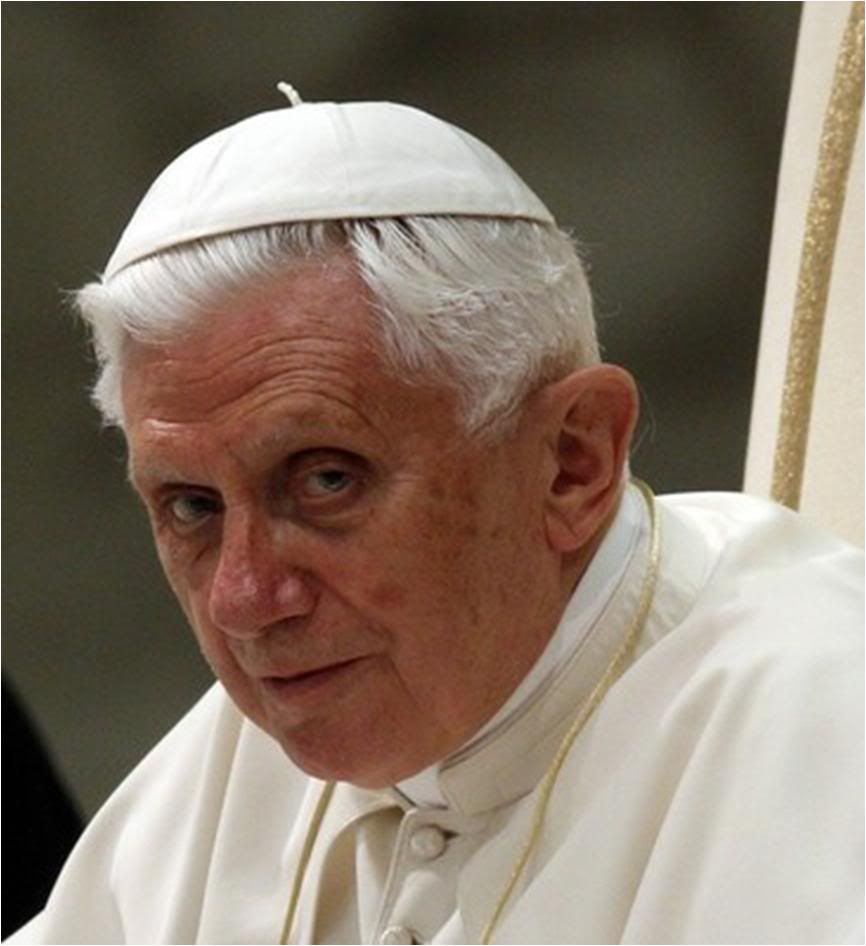
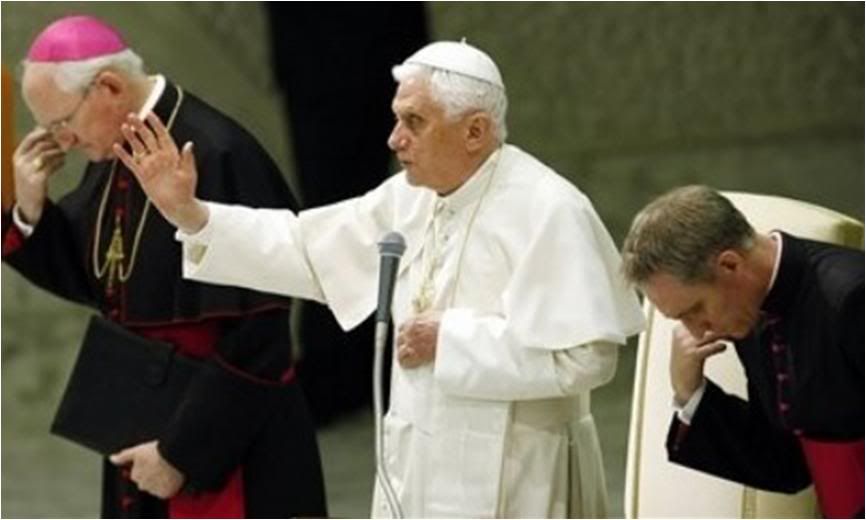
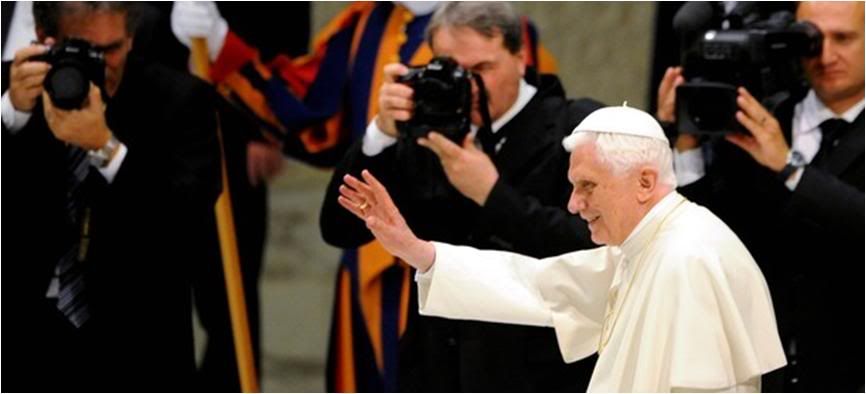
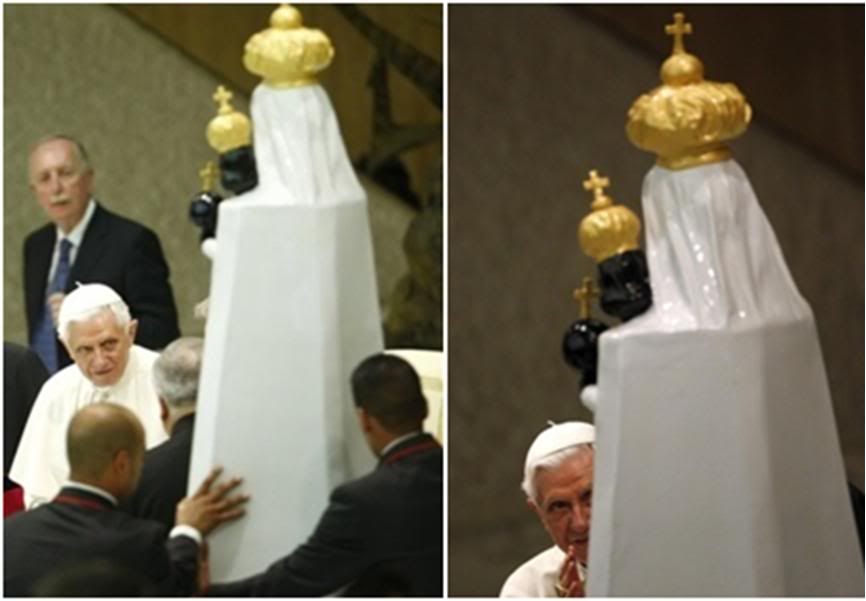
[Modificato da TERESA BENEDETTA 24/06/2010 14:04] |
| |
 24/06/2010 13:55 24/06/2010 13:55 |
|
| | | OFFLINE | | Post: 20.448
Post: 3.086 | Registrato il: 28/08/2005
Registrato il: 20/01/2009 | Administratore | Utente Master | |
|
 I cannot share the assumptions made by this article that recent statements made by Italian 'intellectuals' who have heretofore been downright hostile to Joseph Ratzinger/Benedict XVI necessarily make them 'friends' to him now, or worse, 'Ratzingerian'.
I cannot share the assumptions made by this article that recent statements made by Italian 'intellectuals' who have heretofore been downright hostile to Joseph Ratzinger/Benedict XVI necessarily make them 'friends' to him now, or worse, 'Ratzingerian'.
It's a surprisingly naive conclusion from the writer, an experienced Vatican reporter, who, nonetheless, has shown signs in the past of 'forcing' facts to fit his hypotheses. This is extreme 'forcing'. It is also a kind of slavering and groveling, just because a few – he mentions 3 – anti-Ratzinger professional polemicists now see fit to say something good about the Pope! The Pope is by no means desperate for 'approval', least of all from such types!
Any approving statements that these critics may have made recently of the Pope appear to have been prompted mostly by the Pope's declaration that the persecution of the Church these days is mostly born from within the Church itself (because the massive criticism has been caused by offenses done by some priests and bishops). But they are using that statement to justify all of their own attacks against the Church...
Benedict XVI's new friends:
Strange turnabouts by
Italian intellectuals
by PAOLO RODARI
Translated from

June 23, 2010
The most recent Italian intellectual to turn in favor of Papa Ratzinger is someone considered 'big' in lay opinion: Gian Enrico Rusconi. [A professor of political science in Turin and a scholar on 20th-century Germany, according to Wikipedia. I really do not know what makes him 'big' in Rodari's estimation.]
Yesterday, in La Stampa, Rusconi did not enter into the merits of "suspicions about an improper use of the Church" by Cardinal Crescencio Sepe when he headed Propaganda Fide, but limited himself to praising Benedict XVI, 'The Pope rather snubbed by everyone', who, "notwithstanding the Curial deference that surrounds him, is perhaps finding his own unexpected profile!" [GEE, thanks! HOW CONDESCENDING! 'Snubbed by everyone'? 'Everyone' meaning his fellow liberals - certainly not the world's 1.2 billion Catholics! - and 'perhaps finding his own unexpected profile'??? As though Benedict XVI never knew himself or would have succumbed to 'Curial deference', which in any case, is owed to him as Pope. I cannot believe Rodari considers that statement 'praise'!.
It is a profile Rusconi called "unpopular because it has spiritual dimensions that are not usual for a Church that has lived to project itself towards 'public relevance' with the presumption that it exclusively possesses a monopoly on morality. A Church that still has a nostalgia for great communicative charism, without heed of the costs that she has paid for it". [My God, it gets worse! It goes from condescension to contempt - and an unwarranted and uncharitable reference to John Paul II. Besides, Benedict XVI's spirituality does not detract from the fact that he wants the Church to have a voice in public affairs and has been actively working for that!]
The defense by Rusconi of the Pope - yesterday, L'Osservatore Romano called his words 'lucid and prompt' - was as strong as the criticism he had written in the same newspaper two months ago. [I have not seen the Rusconi article yet, but going by what Rodari has quoted, I wouldn't call it a 'defense' of the Pope at all, but an opportunistic and cynically sardonic comment on the Church! Perhaps even damning the Pope by faint praise!]
On April 16, Rusconi spoke in an interview about the Pope and the 'mediatic short circuits ' he has 'provoked' in the past five years since he became Pope.
He called Regensburg 'a provocation' in which the Pope 'gives a scholastic lecture on Hellenization and arrives at a criticism of Kant'. [Would you put your trust in someone who reduces the seminal Regensburg lecture to something as superficial and deliberately-missing-the-point as that statement? Would you even say he was an 'intellectual'? Would you then set any store by what he has to say about anything else concerning the Pope and the Church? His biases are too obvious.]
He said, "Ratzinger is a professor who over-estimates himself... This Pope is considered in the popular mind as a great theologian, but that is wrong. He is a professor of dogmatic theology. And he is naive!" [Rodari, what were you thinking???? If Rusconi can say that in an article you consider to be 'praising' Ratzinger! A zebra never loses his stripes, much less overnight! Nor can he help showing them, either.]
On March 12, when the German and US press rained down criticism on the Vatican and the Pope for failing to denounce pedophile priests in the past [A failure one cannot lay on Joseph Ratzinger!], Rusconi joined the demands of rebel theologian Hans Kueng that "what the Church lacks is a theological revolution on the subject of sexuality, of which no signs are to be seen". [What possible revolution can there be in the Catholic view of sexuality? That, suddenly, irresponsible sex for pleasure and/or sex that takes place outside of marriage, not to mention homosexual sex, are theologically right?]
Having reached and gone beyond the first five years of his pontificate, Papa Ratzinger finds himself suddenly surrounded by new friends. [Excuse me while I snort! If he means 'new friends' in the media, that has hardly been evident to anyone but Rodari! Certainly no one else in the media has come to this absurd conclusion.]
These include eminent representatives of the so-called 'critical Church' - intellectuals and big names in progressivist Catholicism but even atheists who until yesterday were the harshest opponents of his Pontificate.
The points raised these days by Benedict XVI in his battle against ministers of God who yield to the temptations of the flesh and of power are causing people to jump on the Ratzinger bandwagon one after the other - names who during the entire Wojtyla Pontificate and during the first five years of Ratzinger's, were on the other side.
[First of all, it is not just recently that Joseph Ratzinger has preached against priests who do not live up to their calling in every respect. Did any of these 'names' - who do not mean anything to Catholics outside Italy - react in any way at all when Cardinal Ratzinger commented in April 2005 on the sins of priests as specifically as he could, in the context of a meditation and prayer on the Ninth Station of the Cross? Significantly, the station is 'Jesus falls a third time' - because Jesus falls everytime one of his ministers transgresses.
And how many times in the past five years has he warned priests against careerism, in particular! To say that he has availed of the Sepe case to warn against careerism is to ignore all that he has said before, and also makes it appear that he is, in effect, accusing Sepe of careerism!]
There have been quite a lot of occasions for them to line up with Benedict XVI [Really, name them! And did they line up with him, in fact?]
Two occasions especially: One is the strike from Vienna by Cardinal Christoph Schoenborn against John Paul II's Secretary of State, Cardinal Sodano - a serious denunciation of how sex offenses by the clergy were handled by the Vatican in the past. [A general and cowardly denunciation made 'off the record' to Austrian editors and never substantiated. We can all hope that Sodano will, sooner rather than later, clarify what his own personal involvement was in any cover-ups or 'special treatment' in the case of the late Cardinal Groer, but since this case goes back to 1995, when John Paul II was still a considerable presence, it is not possible to believe that Sodano alone could have been responsible for any special treatment of Groer and that John Paul II would not have been made aware of it!]
The second is taking place, when accusations have been made that have forced one of the most prominent of John Paul II's formidable 'men-machines', Cardinal Crescencio Sepe, to defend himself. Sepe was in the inner circle of Wojtyla's 'pontifical family', a friend of both Mons. Dsiwisz and Wanda Poltawska.
Sepe said in a news conference on Monday: "I accept the cross and forgive frm the depth of my heart all those, within and outside the Church, who have wished to strike me," obivously suggesting that he has enemies even within the Vatican. [Personally, I find the statement rather pharisaical. If there was one man in the world who fully deserves to say that, it would be Benedict XVI, but he is Christian enough not to be that presumptuous!]
The terms of the old conflict seem to have changed. Those who were fierce opponents of the Pope until recently are now full of praise. [That's a generalization that cannot possibly be backed up. So far, Rodari has only mentioned one, and his evidence is ludicrous! He will mention two others further on - which still does not justify his rash generalization.]
"It's a paradox," notes the dean of Vaticanistas, Benny Lai [I thought the dean was Arcangelo Paglialunga, 90!]; "Martinians have become Ratzingerians. More than that, they now seem to claims that there is no difference between Ratzinger and [Cardinal Carlo Maria] Martini!" [With all due respect to Lai, who is 85, that is also another rash and improbable generalization!]
Ratzinger's call for a clergy that is holy and free of careerism, personal ambition, the corruption of ingrained habits culminating in abuse of minors, is the narrow door though which a certain progressivist and liberal Catholicism has chosen to go over to his side. [One must reiterate: The absurdity of this claim lies in the fact that Joseph Ratzinger has not been making that call only lately. All his interview books, starting with The Ratzinger Report in 1994, and every discourse he has given to priests and bishops, has always stressed the need for the priest himself to be holy if he is to preach the Word of God credibly. Why have these supposed 'cross-overs' - and Rodari himself - not taken note of it before????]
These liberals consider Cardinal Schoenborn - "one of the bishops who has been most lucid in facing the crime of pedophilia", in the words of Alberto Melloni - an ally, as is Sepe and all those whom he considers his enemies. [Melloni's praise of Schoenborn is a slight to those bishops of the United States and of other places who have played prominent roles in fighting priesly sex offenses long before the last three years that Schoenborn has been vocal about it].
Giancarlo Zizola, one of the Vaticanistas most sympathetic to the liberal elements in the Church, wrote explicitly in La Rpubblica that Schoenborn's line is exactly that of Ratzinger's. [ Yeah? What was Schoenborn saying in April 2005 at the time of the Via Crucis? Did he use Cardinal Ratzinger's words then as a rallying cry for the priests and the faithful of Austria? And how can he be so condemnatory of sex-offender priests but say nothing at all about the Austrian priests who are openly living in concubinage today and declaring so proudly?
I think that is the fact that bothers me most about Schoenborn's double dealing! And apparent shallowness. His openness to married priests, as he recently expressed, is clearly not at all Benedict XVI's thinking about the necessity for priestly celibacy, expressed most recently at the Prayer Vigil with the priests of the world - which Schoenborn chose not to attend because he was taking part in some secular debate.]
Zizola wrote: "The cardinal from Vienna is wagering his theological and human closeness with Papa Ratzinger, dating to when they worked side by side on the Catechism of the Catholic Church. He is giving voice to the current of thought in the Church that interprets the present crisis as a necessary instrument for liberation from a hidden evil that has been long ignored, a painful but necessary passage in order to regain the perspective of ecclesial erform. He is aligned with those who are convinced that to undergo this crisis thinking that the black clouds will pass and then resume the idea of the Church as 'a perfect society' is a losing proposition."
[Now see what use the Church's enemies are making of Schoenborn's double-dealing? Zizola appears to ignore Benedict XVI's own words and example towards true Church reform - as renewal in continuity - to push the liberals' limited idea of reform as having to do only with overturning the Church traditions regarding priestly celibacy, sex and homosexuality!]
Zizola who a year ago had pitilessly condemned the Pope's action lifting the excommunication of the four Lefebvrian bishops, now praises Ratzinger and his "purifying action...(which has) dismantled the organized system of omerta" in the Church. [That doesn't mean Zizola takes back anything else he has said against Benedict XVI! He is here praising the Pope for doing something that he, Zizola, happens to agree with.]
For Zizola, Ratzinger's desire to carry out "a radical institutional and interior healing of the ecclesiastical system... is the same conviction that led Cardinal Carlo Maria Martini to greet with approval the fact that society demands full light be shed on these criminal doings and that the victims have had the courage to denounce the criminals". [This is ridiculous! So now whatever Benedict XVI is doing must be right because it fits Cardinal Martini's thinking? As though, Benedict XVI had come to a belated recognition of something Martini has always known! Has Martini ever said anything about the internal sins of the Church as strongly and as directly as CArdinal Ratzinger did in April 2005 and since?]
In short, Ratzinger and Martini, the Pope and he who has several times proposed a Third Vatican Council in order to bring the Church in line with lay society, are now totally in tune with each other. [What could be more misleading?]
"In fact," says Sandro Magister, "the infatuation that some liberal intellectuals and newsmen now profess towards Ratzinger is their absolutization of one single aspect: that the Pope calls for penitence from the offending priests and does not cite the Church's enemies on the outside. Since he has not blamed others for the sins of these priests, these liberals want to read it as a sign that he is identifying with their 'frontline' Catholicism. But his message is not simply for penitence". [Too bad Rodari does not cite more of Magister than this. Magister hits the point precisely that these so-called 'new friends' are simply using the Pope's words for now to 'bolster' their own liberal-secular agenda! Have they reacted yet to his pure defense of priestly celibacy? I bet they would quickly revert to type on that subject!]
Before Rusconi and Zizola, there was Alberto Melloni among the new 'friends' of the Pope. [EEEWWW!] The relationship between the Pope and Melloni, the progressivist church historian of the 'Bologna school' that espouses the 'hermeneutic of rupture' for Vatican-II, has swung high and low. [It's not a relationship in any sense, rather Melloni's attitude towards Benedict XVI. I don't remember any high at all in the past five years. In fact, Melloni has been one of the most dependable for a Pavlov's-dog negativereflex to anything Benedict XVI says or does.]]
Initially, Melloni appeared to be strangely fascinated by the new Pope whose Magisterium is the polar opposite of what the Bologna school espouses. In an article entitled "The start of the Ratzinger papacy", Melloni says he believes 'a decisive turning point' is possible. By which he meant: After the 'mediatic' and 'aristocratic' Wojtyla pontificate, coudl Benedict XVI open a new chapter?
Melloni said, "Perhaps. All the features of 'public Wojtylism' [whatever that means!] have been abandoned without unnecessary polemical explanations... The travels have changed. High visibility especially on TV has been dimmed down.... If only because the man's intellectual credibility will allow him to make the most awaited moves: reform the central ecclesiastical institution, especially in a synodal sense, one that a (papal) candidate supported by Italian politicians whould have ignored, and a candidate of those who advocate openness would probably not dare to make".[In other words, Melloni was not so much praising Benedict XVI but projecting his progressivist hopes on him!]
This was the focus of Melloni's hopes: a change in the governance of the Church in synodal mode [another term, I suppose, for 'more collegiality' with the bishops] by a Pope who is not Italian and not progressivist, by virtue of which he would be able to do what others not similarly conditioned would be unable to do: a turning point towards greater collegiality. [Ah, there it is! It has always irritated me that progressivists, whenever they speak of collegiality, always consider it to be one-sided: that the Pope should be more 'collegial' with the bishops, while they never bring up the fact that even Vatican-II repeatedly underscores that bishops should be in communion with the Pope! 'Communion' is a far more accurate and spiritual term for the 'collegiality' envisioned by Vatican-II.
But the progressivists have interpreted 'collegiality' to be synonymous with 'democracy' in the sense of a majority vote or consensus. And yet the doctrine of the Church was set by Jesus Christ and cannot be changed or determined by consensus. Vatican-II whose documents were voted on by the Council Fathers did not alter Catholic doctrine - they simply cast new light on certain outstanding issues that have to do with the Church in the context of today's world, which is subject to legitimate vote.]
In the following months, Benedict XVI did not seem to respond to Melloni's expectations. [So? Was he under a duty to act according to Melloni's expectations?]
On December 22, 2005, the address of the Pope to the Roman Curia marked a rupture with the 'Bolgona school' that appeared unhealable. [It was always unhealable! How can you reconcile a hermeneutic of continuity with one of rupture? They are diametrically opposite!].
Papa Ratzinger - in a speech that one of Bologna school's most prominent representatives, the Church historian Joseph Comonchak who is the American editor of the Bologna school's five-volume History of the Second Vatican Council, called 'the most important intervention by Benedict XVI" - clearly set apart the hermeneutic of discontinuity promoted by the Bologna school and their fellow Catholic progressivists.
Papa Ratzinger was clear: there is no pre-conciliar Church and post-conciliar Church. The Council did not create a rupture: the Church is one and the same, and renewal of the Church can only take place in continuity with the past.
Alberigo and Melloni did not react until around March 2007. When the Pope called on Italian politicians not to betray the 'non-negotiable principles' of the Church with respect to life adn the family, the two progressives signed an open letter that said the Italian bishops' conference, newly under the leadership of Cardinal Angelo Bagnasco, should not speak in public against the legalization of de facto unions - whether heterosexuasl or homosexual - and should "desist from a disgrace that will bring our Church and our country outside history". [P.S. And the Church did manage to scotch that homosexual marriage legislative draft by the Prodi government - it is unlikely to be brought up by Berlusconi's government.]
The distance between the two sides is enormous. The encounter was also about 'Ruinism' [after Cardinal Ruini who was CEI head for 16 years], by which, the anti-Church critics claimed, the Italian Church sought to impose its morality on laymen by actively mobilizing in the public space.
This became even more acute when the Pope signed the motu Proprio Summorum Pontificum - which his critics say he sprung by surprise [What surprise? The media had been speculating about it almost from the day he became Pope!] and without consulting bishops around the world [Another lie! Part of the long delay for the issuance of the MP was the consultation period!]
Melloni wrote in Corriere della Sera in July 2007 that the MP was a 'gross mockery of Vatican II, a useless negotiating instrument with the Lefebvrians, a polemical gesture against Paul VI, an eccess of generosity by a Pope in whose family Mass was celebrated with the priest turning his back to the assembly". [My God! That's the kind of vicious sputtering by detractors that I managed to avoid in the aftermath of SP, as I did not want anything to spoil the joy of it! After such malicious ill will, would you trust any 'praise' coming from Melloni? Yet Rodari apparently does!
And I just hate that formulation of 'the priest turning his back on the assembly' - did anyone ever use that at all in all the centuries before Vatican II? There are pictures galore online of Mass celebrated facing the tabernacle in St. Peter's Basilica during Vatican II. The very formulation betrays the Vatican-II 'spiritist' preoccupation with the 'assembly' at Mass, rather than considering Mass as the sacrifice of Christ being offered and recreated ‘in persona Christi', facing the tabernacle where he dwells in the Eucharist.]
Melloni’s judgment of Benedict XVI’s Pontificate at the time was ‘definitive’: “A pontificate of decisions and counter-decisions: He criticized Assisi and then went to Assisi. He went te Regensburg and then goes to Turkey for reparation”. [That is the most asinine comment ever! The ‘Assisi’ Benedict XVI criticized was the first inter-religious kumbaya in which a consecrated altar was, for instance, used for pagan sacrifices; whereas he visited Assisi as Pope on a pastoral visit. On the other point, his visit to Turkey was on an invitation from Patriarch Bartholomew more than one year earlier and confirmed by the Turkish President later – way before the Regensburg lecture. And he definitely did not go to Turkey ‘to make reparation’ – everyone tried to persuade him to cancel the trip – since the primary objective of the trip was and remained the ecumenical visit with Bartholomew on the Feast of St. Andrtew... Having a reputation as an ‘intellectual’, no matter how ill-deserved, does not give anyone the right to cite wrong data !]
And now? Melloni is apparently with the Pope. [WHO CARES??? The Pope is not that desperate for allies he has to grasp at any apparent ‘support' especially dubious ones!] And also with Cardinal Bagnasco whom in 2007 he asked to shut up. [And Melloni will promptly do so again the moment the CEI takes any stand on any public issue that the Church considers non-negotiable!] At the end of May, Bagnasco closed the plenary assembly of the Italian bishops saying that the Church in Italy is with the victims of priestly abuse and that bishops must act accordingly.
Melloni wrote an article called ‘Praise for the bishop who sides with the victims’ – and likens the CEI to ‘that of the Belgians at the time of Cardinal Daneels’ [What a hoot! After all the Belgian sex abuse cases that surfaced after Daneels had retired, including one about which he had recently spoken to the victim of one of his bishops, no less, and never revealed anything until the case exploded in the media!] or “of the AmericanChurch at the time of Cardinal Bernardin” [Another dubious reference, when Cardinal Bernardin himself bcame the target of a running campaign that he was involved in a homosexual affair!] because, Melloni claims, “perhaps it is finally being felt even outside the Church that the communion among bishops is the most important instrument that the Church has to making everything right, without attenuation and without simple moralisms.”
[Gosh, I don’t know why Rodari feels melloni is worth quoting at all with such stupid statements! As if that ‘communion of bishops’ had done anything positive about the sex abuse problem without Vatican initiative and leadership – in 2002, for the Americans, with the meeting of the US cardinals that John Paul II called and the preceding overhaul of the sex-abuse reporting system by making the CDF the central ‘agency’ rather than relying on the diocesan bishop. And with the Pope’s Letter to irish Catholics this year in the case of Ireland. And why were all the media libs outraged that Benedict XVI had not written a similar letter to the Germans if Melloni thinks that only the bishops can ‘make everything right’?]
Melloni does not mention the CEI leadership before Bagnasco. He does not cite Cardinal Ruini. But behind his words, many thought he was targeting one thing: the CEI policy before Bagnasco, and in general the policy of the Church under the Pontificate of John Paul II [Which is unfair because whatever the problems were under that Pontificate, John Paul II did take that most important step of giving the CDF the clout to investigate and canonically adjudicate sex abuse cases!] - saying Bagnasco’s words had repudiated “a deceitful language that Catholic culture has often affected, according to which the Church is up there on the balcony of truth while secular society is wallowing in the mud below.” [Gosh, how much more contemptuous can you get than that?]
Melloni’s rosy view of Ratzinger further improved with the clearer distance taken by the Vatican from the errors of the past: the cover-up of pedophile cases and the questionable, possibly illicit business affairs by some principal figures of the Wojtyla Pontificate. [Rodari is using a tar brush widely. Besides the Propaganda Fide case, is there any other Curia principal involved in a questionable business affair?]
In a Corriere della Sera column, Melloni does not just praise the patience of the Pope but picks up the line that he took at the start of the Pontificate: namely that the Church can reform itself. [What, he never heard of ‘chiesa semper reformanda’? Rodari is pathetic if he can rejoice that Melloni says “The Church can reform itself”! ‘Semper reformanda’ is precisely the spirit of Benedict XVI’s hrmeneutic of continuity which he defines as renewal and reform in continuity - and he did not need Melloni to tell him that!]
Melloni writes: “The idea of a new Council, so much forgotten that the rather late cock crows for a Vatican III is taken to be new today, corresponds to the most traditional thing in the history of Councils and of the Church in all times – namely, to take the bad (usually bishops) and make them be the cure itself [HUH????], not because of any magic but because of the power of the Holy Spirit. But that idea may take centuries or years to mateiralize without appreciable difference. Until then, the institutution, which is Rome’s boast over its sister churches, remains ungilded”. [What crap! Incidentally, among those 'late cock crows for a Vatican III' is Cardinal Carlo Maria Martini, darling of the liberals.]
It has been said that the new friends of Benedict XVI are the enemies of the late Pope who was the object of ‘papolatry’
[He did not ask for it!], who waged an anti-Communist Crusade [And what was wrong with that? It was a historical contribution], and was fixated on the Gospel of life [And again, what was wrong with that? Every Pope is! It’s their duty]; the same writers who then held up John Paul II as a model in order to run down Ratzinger for Regensburg, for his program for the Catholic Church enunciated in Verona, for ‘failing to reform’ the Roman Curia; and now, they are apparently fervent Ratzingerians at a time when it is fashionable to disparage the Wojtylian Curia in ways not conducive to propagating the holiness of the late Pope that the crowds at his funeral had acclaimed with their cries of ‘Santo subito’.
[Rodari’s concluding paragraph makes my case: Does anyone really care about the opinion of ‘intellectuals’ – I don’t care what local reputation they have in Italy, they all read like hacks, and it’s clear none of them is anywhere near being a Voltaire or a Pascal – who are happy dissing the Church and the Pope most of the time, but are not above literally using the Popes and the Church when doing so could push their agenda?
The ability to string together paragraph after paragraph of weak and fallacious argumentation does not make a piece analytical. Rodari should learn from his editor, Giuliano Ferrara, who marshals his arguments compactly and forcefully, and in elegant language on top of that.]
[Modificato da TERESA BENEDETTA 24/06/2010 14:29] |
| |
 24/06/2010 15:42 24/06/2010 15:42 |
|
| | | OFFLINE | | Post: 20.449
Post: 3.087 | Registrato il: 28/08/2005
Registrato il: 20/01/2009 | Administratore | Utente Master | |
|
 Thursday, June 24, 12th Week in Ordinary Time
Thursday, June 24, 12th Week in Ordinary Time
 From left: Birth of John, Pontormo, 1520; Holy Family with young John, Fra Bartolome, 1507; Jesus and John, Murillo;
From left: Birth of John, Pontormo, 1520; Holy Family with young John, Fra Bartolome, 1507; Jesus and John, Murillo;
and John the Baptist: Bernini sculpture, 1615; Bronzino sculpture, 1555; Rublev icon.
NATIVITY OF JOHN THE BAPTIST
OR today.
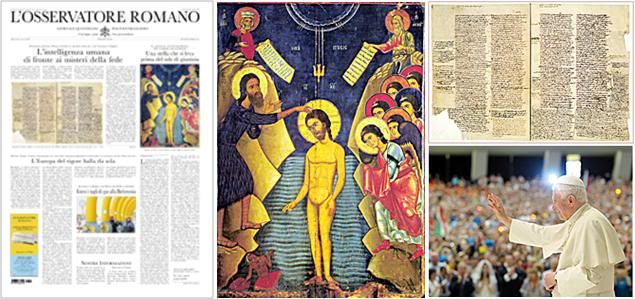 Illustrations: Baptism of Jesus, 11th century icon, monastery of Our Lady of Kaftoun, Lebanon; and manuscript pages of Thomas Quinas, Vatican Library.
Illustrations: Baptism of Jesus, 11th century icon, monastery of Our Lady of Kaftoun, Lebanon; and manuscript pages of Thomas Quinas, Vatican Library.
At the General Audience, BenedictXVI concludes his catecheses on St. Thomas of Aquinas:
'Human intelligence confronts the mysteries of the faith'
A page 1 essay on the birth of John the Baptist continues the OR series on major religious observances in the Siro-Occidental
tradition. Page 1 international news: Berlin, Paris and London will tax financial transactions but other European nations do
not agree; Moscow cuts natural gas pipelines to Belarus because of accumulated debts.
THE POPE'S DAY
Blessing of the restored Madonnina statue at the Don Orione Center on Monte Mario in Rome. Address.
Visit to the Dominican nuns' monastery of Saint Mary of the Rosary nearby, where he presided
at the Mid-Day liturgy of the Divine Office.
|
| |
 24/06/2010 16:50 24/06/2010 16:50 |
|
| | | OFFLINE | | Post: 20.450
Post: 3.088 | Registrato il: 28/08/2005
Registrato il: 20/01/2009 | Administratore | Utente Master | |
|
 Pope blesses restored
Pope blesses restored
iconic statue of Our Lady
overlooking Rome


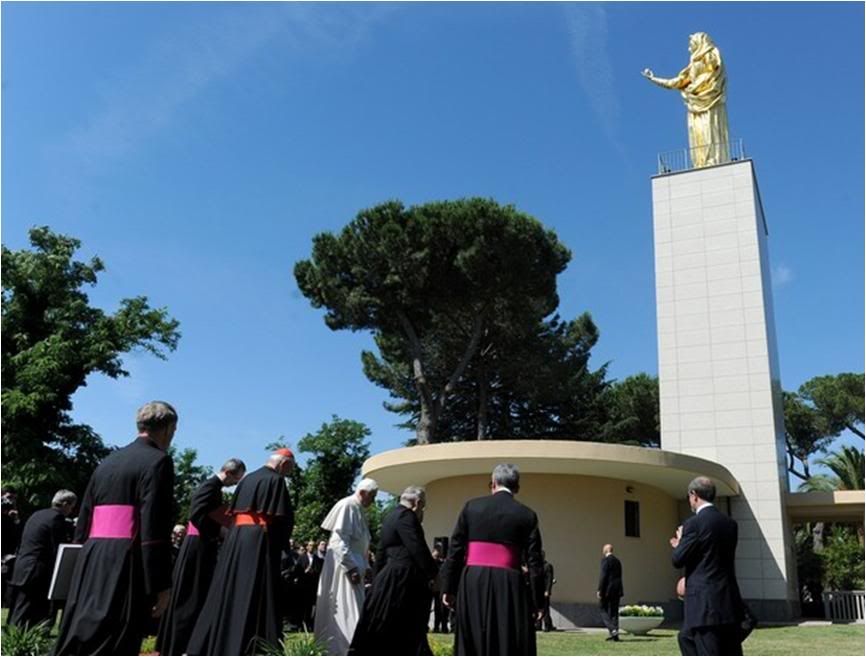
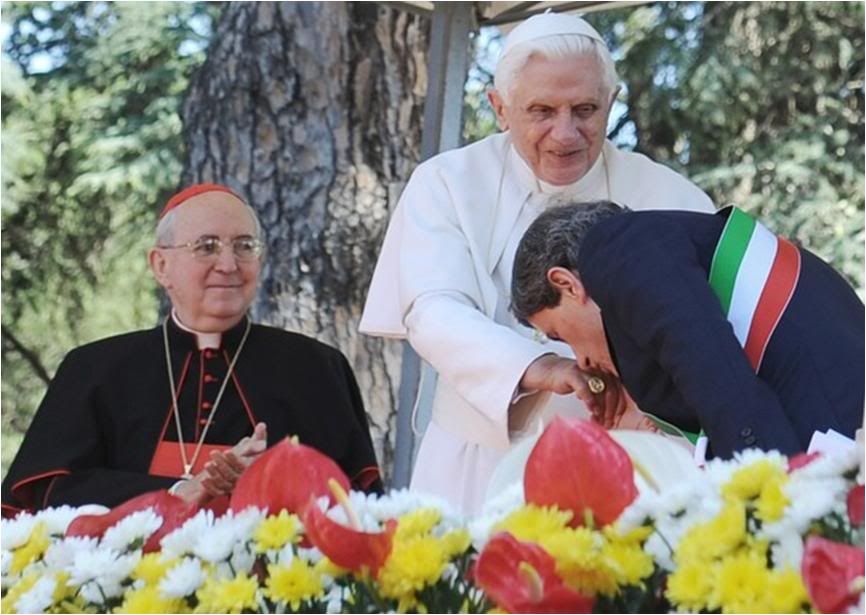 Rome Mayor Gianni Alemanno greets the Holy Father who is with Cardinal Agostino Vallini, his Vicar for Rome.
Rome Mayor Gianni Alemanno greets the Holy Father who is with Cardinal Agostino Vallini, his Vicar for Rome.
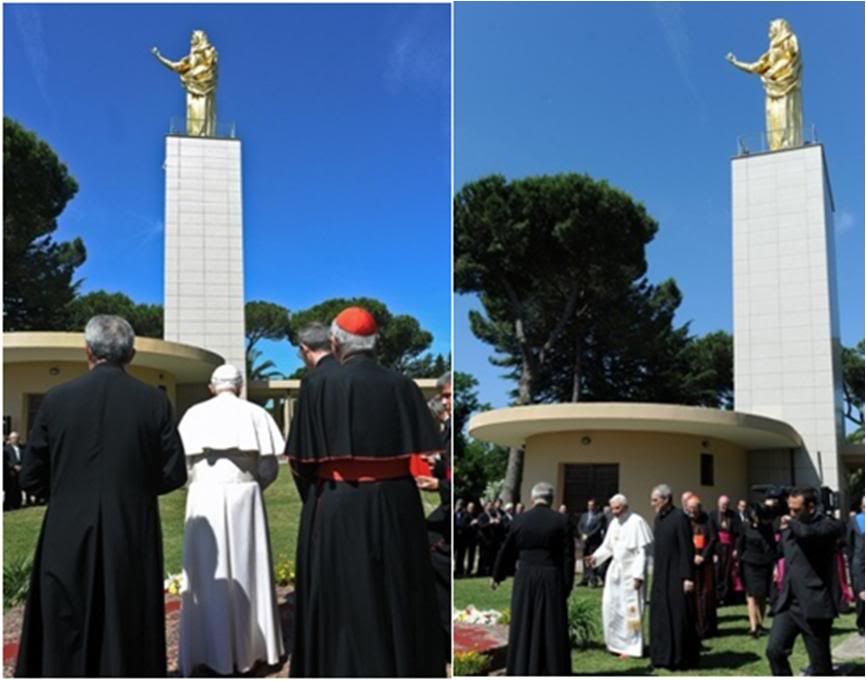
24 Jun 10 (RV) - Early Thursday morning Pope Benedict XVI left the Apostolic Palace and traveled north of Vatican City State to Monte Mario Hill which overlooks the city of Rome.
At the Don Orione Institute for maimed and orphaned children, he blessed a giant statue of Our Lady, especially dear to the Roman people, one they affectionately called “La Madonnina”.
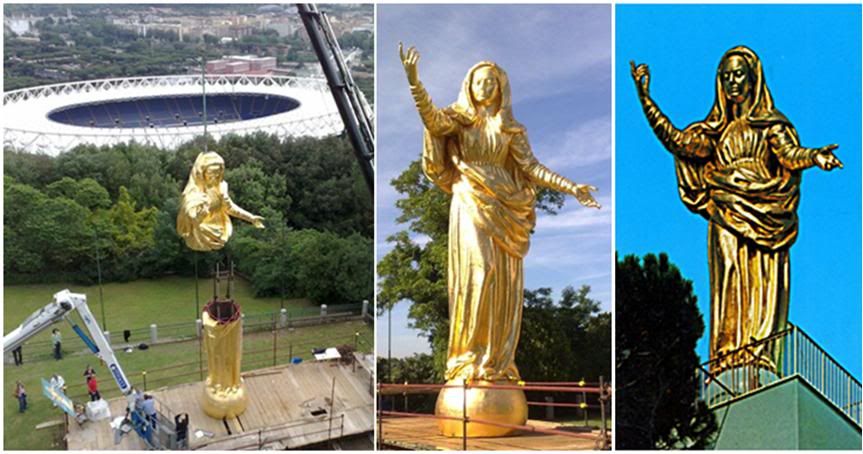 Reassembling the restored statue last week. It overlooks Rome's Olympic Stadium. Right photo shows the statue before the storm that knocked it down last fall.
Reassembling the restored statue last week. It overlooks Rome's Olympic Stadium. Right photo shows the statue before the storm that knocked it down last fall.
Rising 9 metres high, on a pedestal of 20 metres, the great statue of Our Lady, "Salus Populi Romani", collapsed in a violent storm October last.
After blessing the restored and relocated bronze image, the Holy Father recalled the deep bond between the people of his diocese, the statute, and the Don Orione Institute:
He said “the giant statue of Our Lady, demolished a few months ago by the fury of the wind, has returned to this hill to keep watch over our city”.
It is “a dramatic and providential reminder of events, written in the history and conscience of the City. In fact, it was placed on the hill of Monte Mario in 1953, as the fulfilment of a popular vow made during the Second World War, when hostilities and armed conflict made many fear for the fate of Rome. So it was that the Roman centres of Don Orione proposed a petition for a vow to Our Lady, which saw the pledge of over one million people. The Venerable Pius XII took up the devout initiative of the people who wanted to entrust themselves to Mary and the vow was pronounced on June 4, 1944, before an image of Our Lady of Divine Love. On that very day, the peaceful liberation of Rome took place”.
After the war, the collection of copper to be devoted to the statue began. The artist entrusted with its realisation was the Jewish sculptor Minerbi Arrigo (Ferrara, 1881-Padua, 1960). A very special bond united the well-known sculptor to the children of Don Orione, who had saved him and his family from the Nazis, hiding them for five months in late '43 at the Institute of St. Philip.
The artist’s true identity was known only to the Institute Director who had given orders to lay, religious and seminarians not to ask questions about the "surplus" of professors and teachers - in reality persecuted persons who had been given asylum - circulating in the classrooms of the Institute.
In gratitude, Minerbi modelled the dying Don Orione for a marble statue kept in the chapel of Little Cottolengo in Milan and the “Madonna Salus Populi Romani" as a visible sign of the Roman people’s vow.
The "Madonnina" statue is of embossed copper on iron frames, with a gold leaf coating. Her right arm is raised, calling all creatures to raise their gaze On High, toward her Son, while her left arm extends toward the city, to invoke divine protection upon all its inhabitants.
Reflecting on the location of the statue, a centre for disabled and orphaned children, Pope Benedict said "The program of St. Luigi Orione, 'Only charity will save the world', was meaningfully realised here".
"Don Orione lucidly and passionately lived the Church's task to live love to allow the light of God enter the world (cf. Deus Caritas Est, 39). He left that task to his disciples as a spiritual and apostolic path, believing that 'love opens our eyes to faith and warms hearts with love for God".
Concluding his address the Holy Father said: "Works of charity, be they personal acts and or services offered to vulnerable people in large institutions, can never be reduced to philanthropic gestures, but must always remain a tangible expression of God’s providential love. Don Orione reminds us that for this to happen we must be moulded in the tender charity of Our Lord' (Writings 70, 231) through an authentically spiritual and holy life. Only then can we pass from the works of charity to charity of works, because - added your founder - works devoid of the love of God, but evaluated before him, are worthless' (cf PSMC, 19.6.1920, P.141).
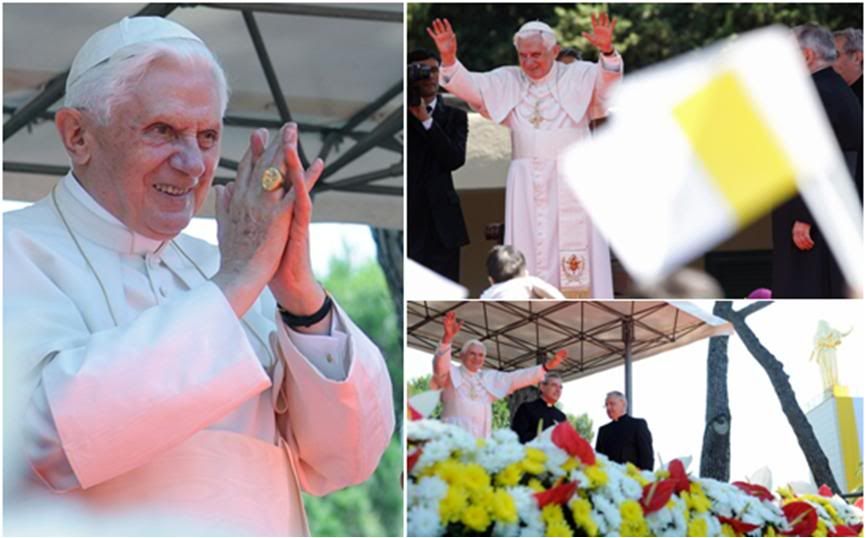
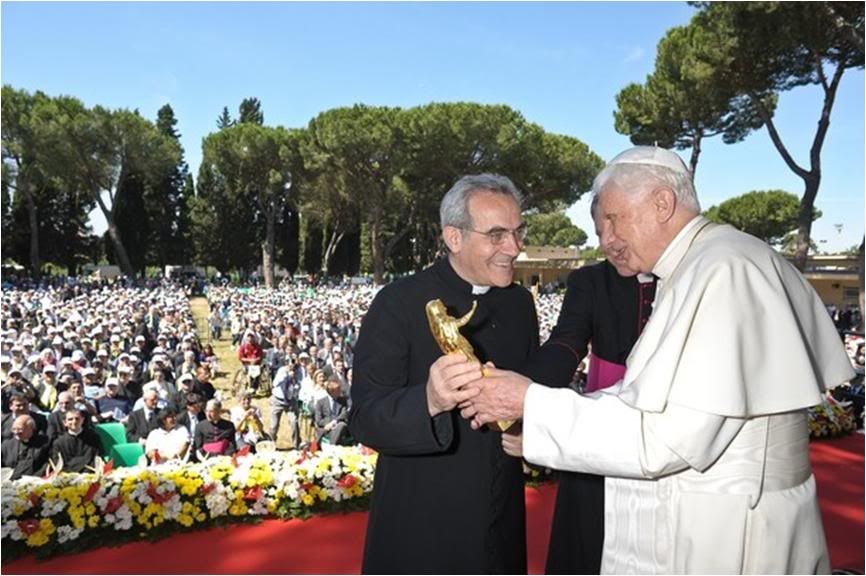
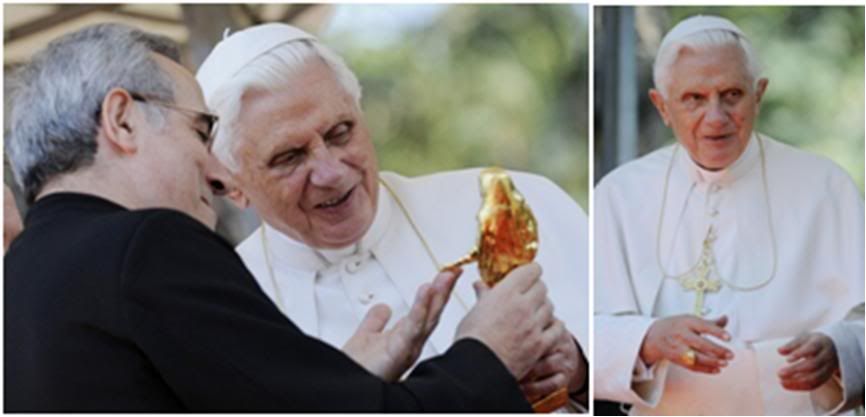
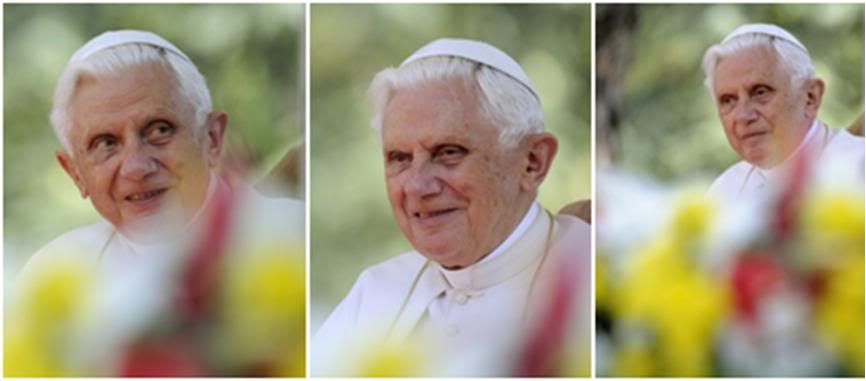
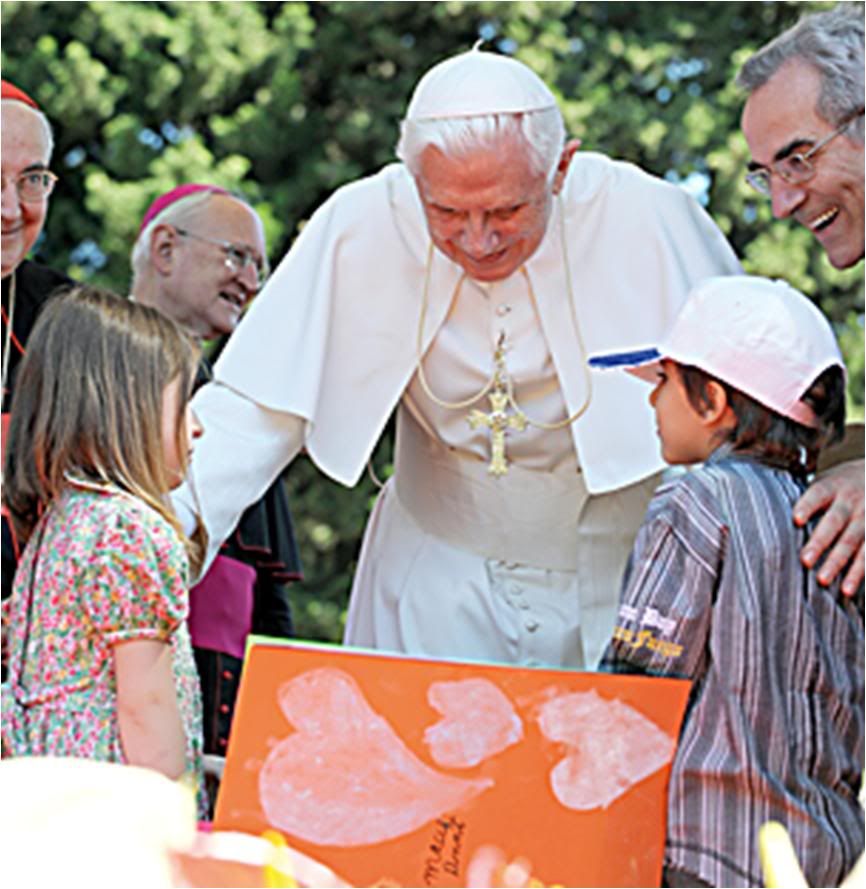
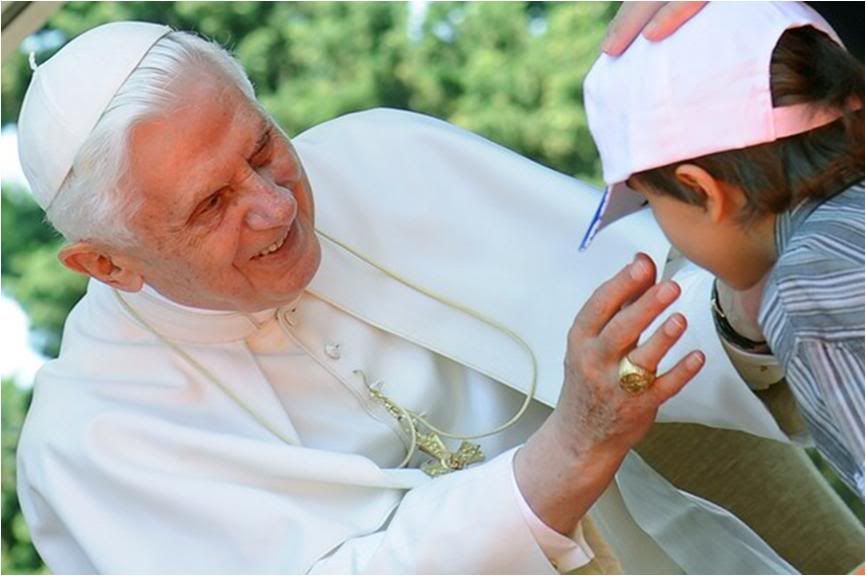
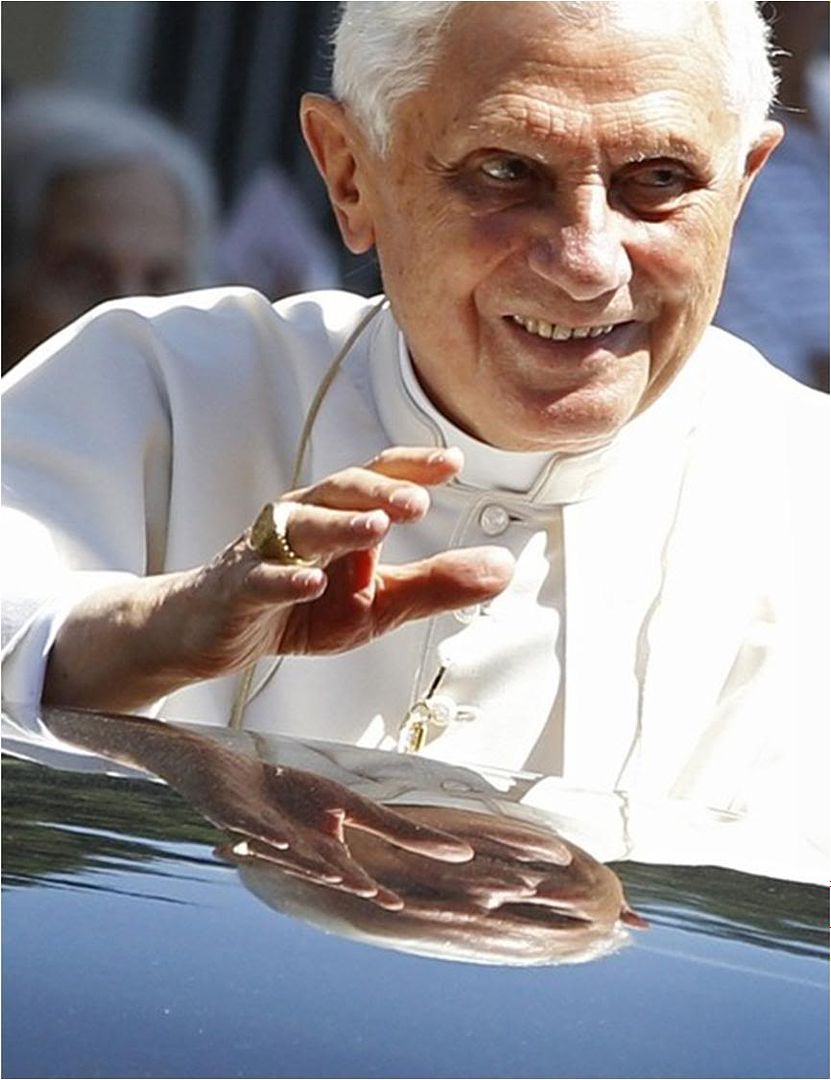
The Don Orione Center has a sprawling complex on Monte Mrio which includes a hospitality center for the needy, handicapped and aged, and a sophisticated rehabilitation center for the nadicapped, as well as various favilities for vocational training and spiritual formation.
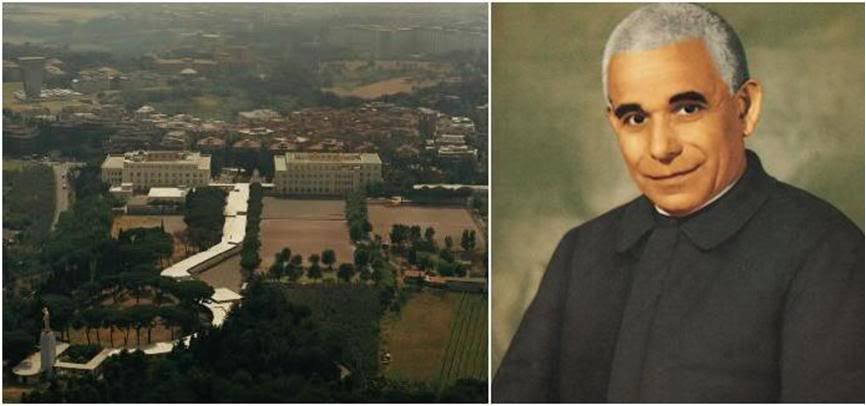 In the photo showing the Orione center in Monte Mario, the Madonnina can be seen at the lower left corner; right, St. Luigi Orione.
In the photo showing the Orione center in Monte Mario, the Madonnina can be seen at the lower left corner; right, St. Luigi Orione.
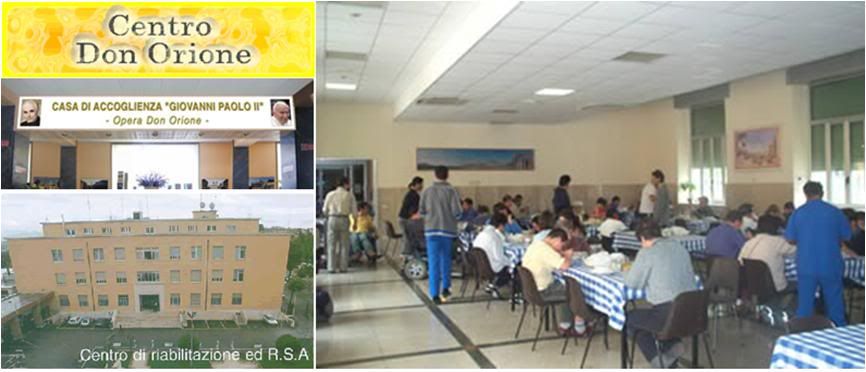
Don Luigi Orione (1872-1940) was a student of Don Bosco and one of those remarkable 'social saints' produced by Turin in the 19th century. He founded the Piccola Casa della Divina Provvidenza to propagate his charitable centers all over Italy and in tehAmericas. He was beatified in 1980 and canonized in 2004.
From the Don Orione Center, the Pope proceeded to the nearby Monastery of Santa Maria del Rosario for cloistered Dominican nuns. He presided at the noonday Liturgy of the Divine Office and delivered a homily.
[Modificato da TERESA BENEDETTA 25/06/2010 12:55] |
| |
 24/06/2010 17:53 24/06/2010 17:53 |
|
| | | OFFLINE | | Post: 20.451
Post: 3.089 | Registrato il: 28/08/2005
Registrato il: 20/01/2009 | Administratore | Utente Master | |
|
 German Catholics to
German Catholics to
rally for Benedict
by Edward Pentin

Thursday, June 24, 2010
Rallies and meetings to show solidarity with the Holy Father appear to be catching on, not least in Benedict XVI’s native Germany.
According to an article in today’s Die Tagespost, a group called “Germany for the Pope” has organized two rallies in Cologne and Munich on Sunday, July 11 – the Feast of St. Benedict.
The idea came from Sabine Beschmann who watched on YouTube the large rally held in St. Peter’s Square last month in support of the Pope following the sexual abuse crisis. An estimated 200,000 faithful travelled from all over Italy to join him in the Angelus prayer.
Beschmann, who developed a stronger bond with the Church and the Successor of Peter following participation in World Youth Day, wondered if Germany could do the same thing. And so far, she says the response has been very positive – all the more surprising given Germany’s reportedly very secular society.
The article says “thousands of Catholics have said they will take part in the solidarity rallies, and it is growing every day. Many want to travel by rail or bus from other dioceses - despite the World Cup final, which is to take place in the evening.”
Even a Cologne-based printing company has provided free flyers and posters which have been sent across to parishes, religious and spiritual communities across the country.
To gauge public opinion, Beschmann set up a Facebook page and almost immediately received hundreds of fans, “mostly from young people”, she says. Then she set up a web page and planned on a date, the Feast of St. Benedict being the most appropriate. Although the events probably won’t attract as many as 200,000, it looks promising.
This initiative is very welcome. Two days ago, someone from the Forum for German Catholics lamented that Germasn could not mount a rally as the italians had done last month in Rome. Apparently, they were not checking online for such an initiative!
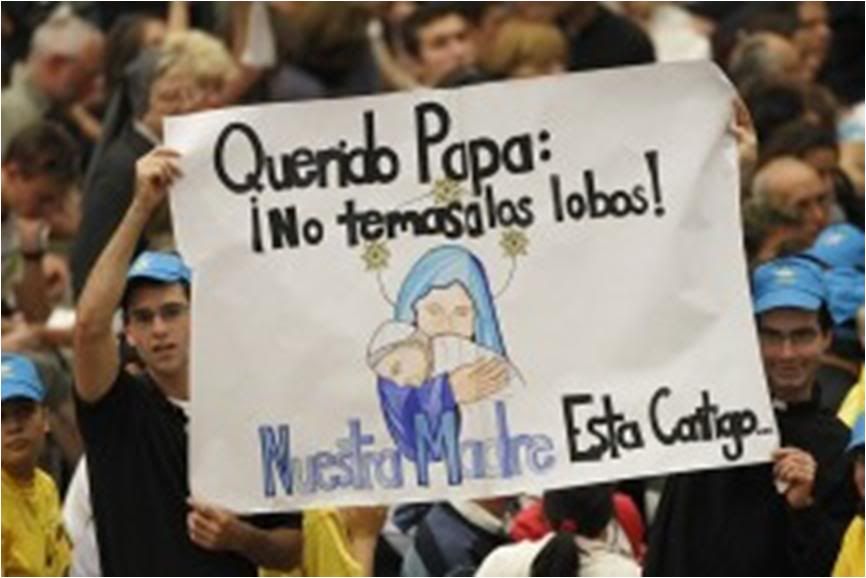 At yesterday's GA, Hispanic youth hold up a sign that reads" "Dear Pope: Don't fear the wolves! Our Mother is with you."
Ratzinger professorial chair
At yesterday's GA, Hispanic youth hold up a sign that reads" "Dear Pope: Don't fear the wolves! Our Mother is with you."
Ratzinger professorial chair
at University of Regensburg
Also from Germany is the news that the University of Regensburg has created a chair devoted to deepening the thought of Benedict XVI. According to an article in Il Giornale, the idea came from former students of Professor Joseph Ratzinger presided by Cardinal Christoph Schoenborn, the Archbishop of Vienna.
Starting next year, the position will be filled by a German or foreign professor who will conduct a study for a maximum of three months in Regensburg. The paper says he doesn’t have to be a theologian but could be a philosopher or someone similar.
The hope is that in 5 years, “it will contribute to the study of theology according to the spirit of Joseph Ratzinger.”
 I've checked out the rally website mentioned above:
www.deutschland-pro-papa.de/index.html
I've checked out the rally website mentioned above:
www.deutschland-pro-papa.de/index.html
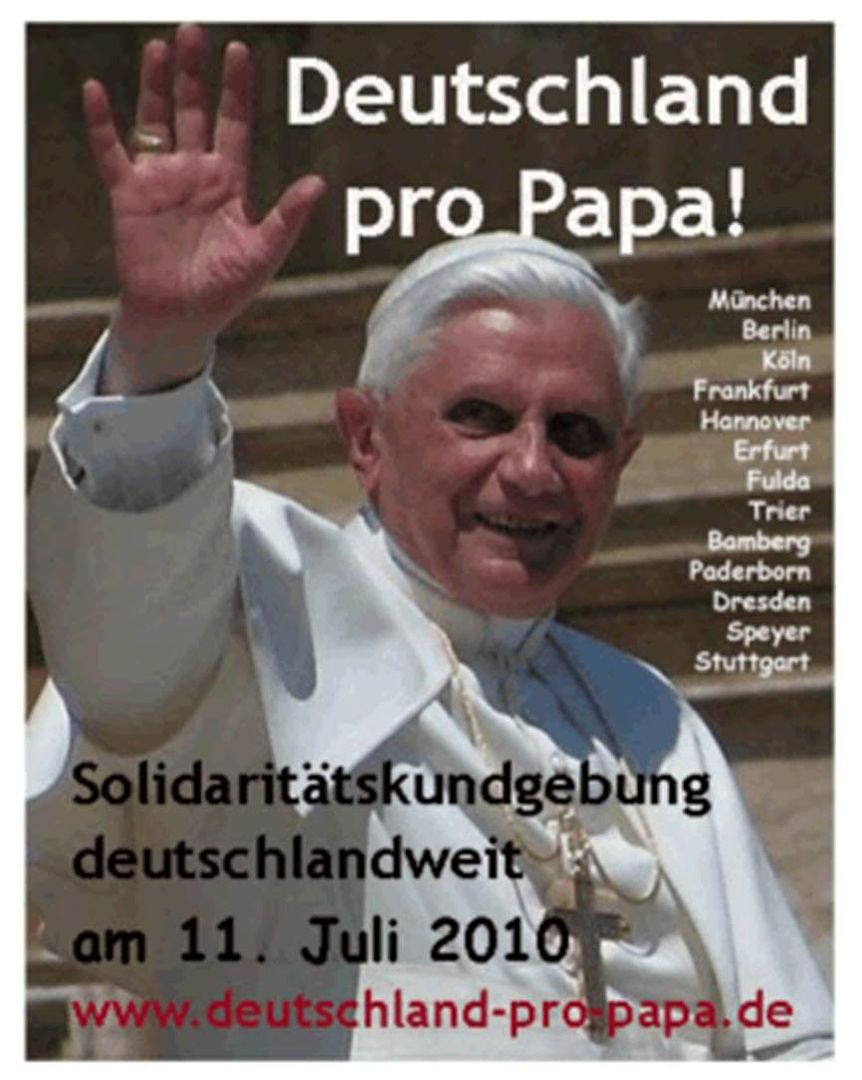
 I'll be checking it between now and July 11 to check how they're doing with participation....
I'll be checking it between now and July 11 to check how they're doing with participation....
[Modificato da TERESA BENEDETTA 24/06/2010 19:17] |
| |
 24/06/2010 20:01 24/06/2010 20:01 |
|
| | | OFFLINE | Post: 305
Post: 62 | Registrato il: 28/05/2007
Registrato il: 19/02/2009 | Utente Comunità | Utente Junior | |
|
I was the first to sign up for the Arch-Dioceses of Bamberg!!!
This is SO great!!!!

Congrats! Hope everything will turn out well - AND BETTER THAN WELL! If only all Benaddicts could project their holograms onto each of the meeting sites!...
TERESA
[Modificato da TERESA BENEDETTA 24/06/2010 21:13] |
| |
 24/06/2010 20:18 24/06/2010 20:18 |
|
| | | OFFLINE | | Post: 20.452
Post: 3.090 | Registrato il: 28/08/2005
Registrato il: 20/01/2009 | Administratore | Utente Master | |
|
 Coventry cancelled as site
Coventry cancelled as site
of Newman beatification Mass

Jun 24 2010
THE POPE will not be coming to Coventry, the Catholic Church has confirmed.
The plug was officially pulled on Pope Benedict XVI’s huge open air mass at Coventry Airport after months of planning.
The church has switched the venue for September’s visit to the much smaller Cofton Park in Birmingham.
The Telegraph has learned the first news of the Vatican’s decision came in a phone call yesterday morning from Archbishop of Westminster, Vincent Nichols, to Coventry City Council leader John Mutton.
It ended weeks of speculation over the venue for the landmark event of the papal UK trip - the beatification of Cardinal John Henry Newman.
Councillor Mutton told the Telegraph: "The Archbishop rang to say it will not now be in Coventry.
"The reason he gave was that Cofton Park is right next to where Cardinal Newman was buried.
The beatification for the sainthood will be made at the same time.
"The papal advisers understand that Cofton Park does hold fewer people, but they think that’s a price worth paying to be close to Cardinal Newman’s resting place.
"The Archbishop thanked Coventry and said all the good work the city would put into the visit could be transferred to Birmingham.
"He knows we would have made an excellent job of it, just as we did for the last papal visit to Coventry Airport in 1982.
I feel 'robbed' even if there is no chance I could go to England for the papal visit! If the Church could have staged a Mass in Coventry airport for John Paul II in 1982, I do not understand why they were unable to arrange it for Pope Benedict's Mass which will be England's first beatification rite on home ground! Yes, costs would have gone up, but the bishops of Scotland managed to arrange for Bellahouston Park to the the Papal Mass site again this year as they did in 1982.
And then there comes a story like this! I dare you to finish reading it without being brought to tears of great emotion towards the end!
Preparing for the Pope
by Joanna Bogle

6/24/10
It sounds like something that would at one time have been every British Catholic's dream: The Pope comes to England for a state visit; he is received by Her Majesty the Queen; he addresses members of Parliament in Westminster's Great Hall, where St. Thomas More was tried four centuries earlier; and he celebrates a great public Mass at which John Henry Cardinal Newman is beatified.
But the upcoming papal visit in September has encountered problems from the start. The tragedy is that they are not problems rooted in the old anti-Catholicism of Britain's past -- which would have made a papal visit in the 18th, 19th, or even early 20th centuries a complete impossibility -- but in the very modern tensions of the Britain of the 21st century.
The invitation to Pope Benedict XVI was initiated earlier this year by then-Prime Minister Gordon Brown -- essentially for political reasons connected with boosting his international status (news of the plan first emerged while he was flying to America to meet President Barack Obama) and increasing his popularity with Catholics in his native Scotland (where Keith Patrick Cardinal O'Brien of Edinburgh had been deeply critical of government policy on issues of marriage and family).
There was then an embarrassing hiatus while Rome and the bishops' conferences of England, Wales, and Scotland had to await further information. When that finally came, there were statements of general enthusiasm, but it was only too clear that there would be difficulties: The visit was planned for September, which allowed very little time for organization and planning; and there was an embarrassment about funding it all, because a state visit means use of taxpayers' money.
Just as these tensions were being discussed, the much-hyped clergy sex-abuse story blazed its way across the world, with lurid material pumped out day after day: German bishops urged to resign, allegations of abuse in Italy, American tales from the 1980s revived alongside inaccurately reported and confused material -- and, of course, the full hideous Irish disaster.
As the stories were worked and re-worked, the headlines grew more dramatic, and the media adored it: The Times [obviously, the mother bitch of all the anti-Papist Pavlov dogs] called for the Pope to resign, as did a number of prominent columnists; there were endless letters and op-eds written by people who announced themselves as devout but now disillusioned Catholics; and organizations once deemed neutral on religious issues, such as the BBC [Which has not been neutral since World War II!], denounced papal statements and Church teachings at random.
Then came the ghastly Foreign Office memo. Here, we reached a nadir: It emerged in April that the Foreign Office staff organizing the state visit had produced a memo suggesting that the Holy Father be invited to open an abortion clinic and preside at a same-sex wedding.
No, it wasn't a joke -- or, at least, it didn't appear to be one. We had to watch while our Foreign Office at first tried to bluster things out, only to finally admit that something seriously wrong had occurred and issue an apology to the Holy See and a reprimand to the staff concerned.
News from the committee established by the bishops to organize the ecclesial side of the visit was not much better. Huge practical difficulties presented themselves: Quoting "health and safety regulations," the bishops announced that numbers at papal events would have to be severely curtailed, and Britain's Catholics were urged to remain at home and watch the proceedings on TV.
We also learned that some of the planned venues had been turned down because they were deemed unsuitable, and rumors circulated that a proposed event for young Catholics would be limited to one -- yes, one -- young person from each parish.
It all went over extremely poorly, especially as it coincided with an appeal for funds to finance the very events from which ordinary Mass-goers would be excluded.
All this, plus announcements of anti-papal demonstrations planned by the National Secular Society and all sorts of media-savvy atheists. And we still have the summer ahead, when silly-season stories can whip up plenty of anti-Catholic grudges.
It has all been a mess. But then, the whole history of the Church has been one long series of messes, and it has to be said that God seems to be more than capable of drawing great good out of things that His children begin very badly.
There is, in fact, huge enthusiasm for the papal visit among ordinary Catholics in Britain. People want to see him, they want to cheer him, they want a World Youth Day-type event for young people and a huge celebratory Mass for the beatification of Cardinal Newman.
They don't want to be told that they should watch the Holy Father on TV; we can all do that any time. We want to be with him when he comes to Britain.
It is a sentiment from the heart, echoing the emphatic statements and announcements and e-mails and conversations and indignation-sessions that have been the stuff of life among Britain's Roman Catholics in recent weeks.
We are well aware that modern Britain -- unlike the nation that welcomed Pope John Paul II back in the 1980s -- is now awash with nitpicking health-and-safety regulations, and that organizing great events could pose challenges. But we are also well aware that vast crowds routinely gather for football matches, pop festivals, and royal events.
We understand that the Church in our country is at a stage that could use a boost to morale, and a papal visit would provide just that.
Mass attendance figures here in Britain have risen, not fallen, in recent months -- if anything, the media headlines focusing on scandals seem to have given Catholics a renewed sense of the things that really matter, rather than making them reject the Church because of the sins of a few priests.
There is an increasing recognition of tensions between government policies -- on sex education, on care of the dying, on marriage -- and the stance of the Church. Catholics feel a need to draw together. This is an excellent moment for a papal visit, and the mood is increasingly ripe for it to work well.
So what happens next? We must hope -- and pray -- for opportunities for ordinary Catholics in England to greet the Pope -- not least in the streets of London when he travels to and from Parliament.
Catholics in Scotland have already ensured that there will be a great event there -- a grand Mass at Bellahouston Park that will be packed out.
We need to be emphatic about seeing Benedict: We won't be banned from the streets of our capital city, and we won't settle for minimum possibilities for the young to be with him. Catholics in Britain have been to World Youth Days overseas, and to Rome, and they know what it can and should be like.
As a students' chaplain put it in the Catholic Herald recently:
We have to make the case that this is not just any public event. This is like nothing else on earth: not a rock concert or not a demonstration. Catholics would want to be squeezed together, hot and sweaty, if that's what it takes to see the "sweet Christ on earth", as St Catherine of Siena described the Roman Pontiff.
We are going to turn out for our pope, and our bishops must be encouraged to tackle the public authorities with that in mind -- "to kick up a fuss, to overcome whatever obstacles could keep British Catholics from having direct contact with their spiritual Father."
Join us in prayer. Storm heaven that all will be well. Ask for the intercession of our martyrs -- Sts. John Fisher, Thomas More, Edmund Campion, Anne Line, Ralph Sherwin, Robert Southwell, Margaret Clitheroe…
If some of these names are unfamiliar to you, it is because they died for the faith in the years when the Catholic Church was banned in the United Kingdom; when you could be hanged, drawn, and quartered for being a Catholic priest; when Mass was said secretly; when to be a Catholic was to be deemed a traitor.
They persevered, and the Faith that they loved was passed on to us; and now we have parishes across the country, a great cathedral in Westminster, young people who are enthusiastic in their Faith -- and a visit from the Holy Father himself, who will meet the queen at Holyrood Palace and address our legislators in London.
God can do great things. A papal visit that started with a series of muddles is nothing compared to 400 years of persecution. Pray with us, that the voice of Peter's successor may be heard in our country. Pray for us, that this visit may exceed all expectations of success and bring much, much good to the United Kingdom. You won't be praying alone.
BRAVA, MS BOGLE! Yes, we will pray with you and for you, for all the people of the United Kingdom! God bless!
Anna Arco has more details about the Pope's last event during the visit:
Pope to visit Newman's rooms
at Birmingham oratory

June 24, 2010
Pope Benedict XVI will visit the Birmingham Oratory during his trip to Britain, it emerged today. While he is there he will visit Cardinal John Henry Newman’s rooms.
There had been some doubt about whether the Pope would visit the Oratory because of controversies within the Birmingham Oratory community, but it is an obvious stop for the Pontiff because Newman lived there in his final years. It holds his library as well as the relics that were found when grave was opened in 2008.
A spokesman for the Bishops’ Conference of England and Wales said that the visit’s organisers had asked Birmingham City Council for the use of Cofton Park for Newman’s beatification on September 19.
He said that, while the details still had to be worked out with the City of Birmingham, they hoped that at least 80,000 people would be able to attend. The site is near Rednal, where Newman’s Oratorians had a house and where the Fathers of the Oratory were later buried. Cardinal Newman’s grave is there.
The spokesman said: “Cofton Park will have more historical resonance, because it is next to Rednal. The Oratorians used to take their recreation in Cofton Park. What is important is that it enables a visit to the Birmingham Oratory. If it all works out, the Pope will make a private visit to Newman’s rooms.
“After lengthy discussions with the Vatican, we were hoping for something with close historical references. And Cofton is our prefered venue in Birmingham.”
Coventry Airport had been touted as the original venue for the Pope to beatify Newman and organisers were hoping the venue would fit 200,000 people.
The spokesman said: “Coventry was being discussed in good faith but as the detail of the planning became more apparent and the Pope was keen on something with more historical references and links to Newman the attraction to moving it to Cofton Park became more apparent.” [Uh-oh! Sounds like a cop-out alibi for not having managed to get Coventry airport!]
Both Longbridge car factory and the seminary at Oscott had been reported as possible venues for the beatification. This week, a Vatican team scouted out locations in and around Birmingham Archdiocese.

 Cardinal Newman's Birmingham
Cardinal Newman's Birmingham
 Cofton Park is green space surrounded by the old Austin-Rover car plant on two sides, now scheduled for redevelopment. It is a few miles away from Rednal, the little village where Newman was buried until his 'remains' were transferred to the Birmingham Oratory on All Saints Day, 2008. Center photo: Jack Sullivan and his wife visiting the graveyard at Rednal, after Sullivan's miracle cure was certified for Newman's beatification. Right photo: Archbishop Vincent Nichols, then Archbishop of Birmingham, praying before the reliquary, after officiating at a traditional Mass for the translation ceremony. When the grave was opened in October 2008, no mortal remains were found except a few locks of hair and items buried with Newman.
Cofton Park is green space surrounded by the old Austin-Rover car plant on two sides, now scheduled for redevelopment. It is a few miles away from Rednal, the little village where Newman was buried until his 'remains' were transferred to the Birmingham Oratory on All Saints Day, 2008. Center photo: Jack Sullivan and his wife visiting the graveyard at Rednal, after Sullivan's miracle cure was certified for Newman's beatification. Right photo: Archbishop Vincent Nichols, then Archbishop of Birmingham, praying before the reliquary, after officiating at a traditional Mass for the translation ceremony. When the grave was opened in October 2008, no mortal remains were found except a few locks of hair and items buried with Newman.
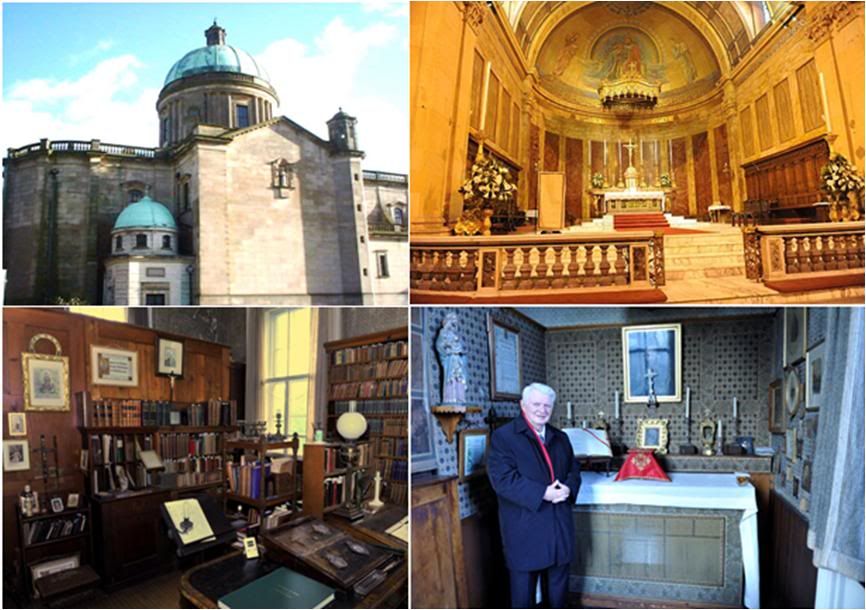 The Birmingham Oratory, where Newman lived from 1850 to his death. The Holy Father is now expected to visit his rooms - in which his large study, lower left, also contained his private chapel, lower right. Jack Sullivan is in the picture.
While searching out these photos, I also came across this quotation from Cardinal Newman:
Cardinal Newman on the role of the Pope:
The Birmingham Oratory, where Newman lived from 1850 to his death. The Holy Father is now expected to visit his rooms - in which his large study, lower left, also contained his private chapel, lower right. Jack Sullivan is in the picture.
While searching out these photos, I also came across this quotation from Cardinal Newman:
Cardinal Newman on the role of the Pope:
Peter is no recluse, no abstracted student, no dreamer about the past, no doter upon the dead and gone, no projector of the visionary.
… If there ever was a power on earth who had an eye for the times, who has confined himself to the practicable, and has been happy in his anticipations, whose words have been deeds, and whose commands, prophecies - such is he in the history of ages, who sits from generation to generation in the Chair of the Apostles, as the Vicar of Christ and Doctor of His Church.
[Modificato da TERESA BENEDETTA 25/06/2010 14:18] |
| |
 24/06/2010 21:39 24/06/2010 21:39 |
|
| | | OFFLINE | | Post: 374
Post: 17 | Registrato il: 17/05/2006
Registrato il: 02/05/2009 | Utente Comunità | Utente Junior | |
|
Kind of you to respond to my requests, Cowgirl. Many thanks, also for sharing your thoughts on this and other matters.
You grew up near the famous Luther(an) castle/fortress! - the only man made structure for which Protestants perhaps feel some emotion and a tradition of "veneration", apart from Getsemane (etc.) in Jersualem! Your conversion in that respect has definitely been more dramatic than mine ![[SM=g7566]](https://im0.freeforumzone.it/up/0/66/3457662.gif) .
Thanks also for the links to the Ebangelical german Church, highly appreciated. We are all crossing our thumbs for a positive development in Germany and I, for one, am following it very closely and for many reasons, one being my own ancestry, another my love of history including that of the churches and the Church!
Teresa: with reference to the new papal friends from the intelligentsia in Italy..... ![[SM=g7869]](https://im0.freeforumzone.it/up/0/69/3139731.gif) ![[SM=g7869]](https://im0.freeforumzone.it/up/0/69/3139731.gif) ![[SM=g7969]](https://im0.freeforumzone.it/up/0/69/3179631.gif) ![[SM=g7966]](https://im0.freeforumzone.it/up/0/66/3640462.gif) ![[SM=g8778]](https://im0.freeforumzone.it/up/0/78/2633400.gif)
[Modificato da Crotchet 24/06/2010 21:48] |
| |
 25/06/2010 12:19 25/06/2010 12:19 |
|
| | | OFFLINE | | Post: 20.454
Post: 3.092 | Registrato il: 28/08/2005
Registrato il: 20/01/2009 | Administratore | Utente Master | |
|
 Benedict to the Dominican nuns of Monte Mario:
Benedict to the Dominican nuns of Monte Mario:
The hidden power of cloistered prayer

24 June 10 (RV) - On Thursday morning, Pope Benedict XVI paid a pastoral visit to the Don Orione Centre and the Dominican Convent of Our Lady of the Rosary on Monte Mario hill, northern Rome.
The Holy Father’s first stop was at the Don Orione Centre, where he blessed the giant statue of Our Lady 'Salus populi romani' which has been restored after it was toppled by a storm October last.
Pope Benedict then travelled the short distance from the Institute to the Dominican Convent of Our Lady of the Rosary, to preside over the recitation of the Midday Prayer.
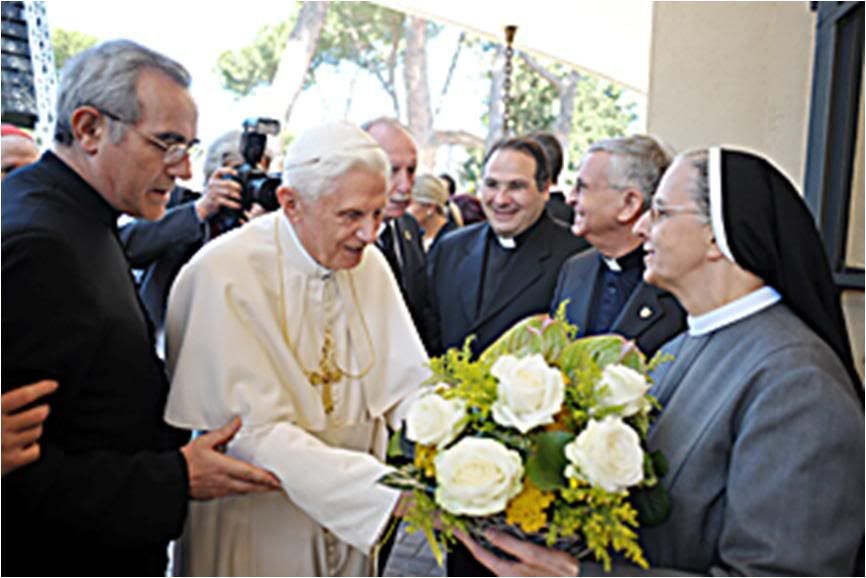 The Holy Father is greeted by Suor Maria Angelica Ubbriaco, prioress of the convent.
The Holy Father is greeted by Suor Maria Angelica Ubbriaco, prioress of the convent.
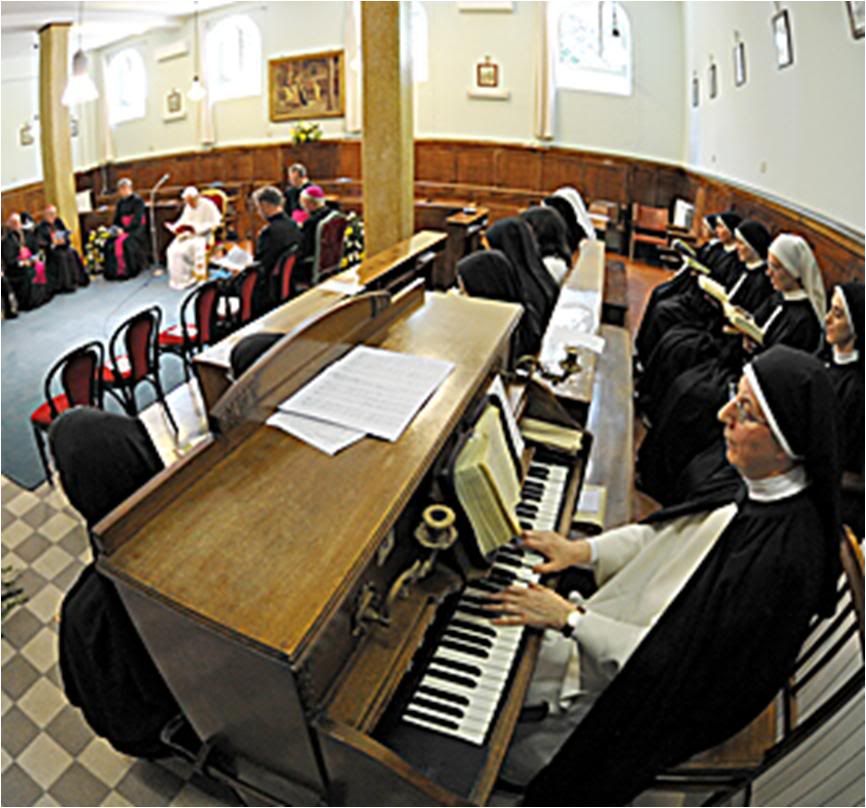
The convent has custody of an ancient icon of the Virgin, known by its Greek title, Hagiosoritissa (The Intercessor), also known as Our Lady of St Luke, dated to the VII century.
In his homily to the cloistered nuns, the Pope stressed the fundamental importance of their prayer for the life of the Universal Church and his ministry as its pastor. He said:
The contemplative life which, from the hands of St. Dominic, you received in the form of the cloister, makes you living and vital members in the heart of the Lord's mystical body which is the Church.
And just as the heart causes the blood to circulate and keeps the entire body alive, so your hidden lives with Christ, imbued with work and prayer, contribute to maintaining the Church, the instrument of salvation for all mankind whom the Lord redeemed with His Blood..It is from this inexhaustible source that you draw with prayer,
You have chosen to live in obscurity and to renounce earthly goods in order to desire above all other things the good that has no equal, the precious pearl for which it is worth abandoning all else.
The Holy Father concluded by inviting the religious "to pronounce your 'yes' to the designs of God every day, with the same humility as that with which the Blessed Virgin pronounced her 'yes'".
Before taking his leave, Pope Benedict stood in reverence before the icon of Hagiosoritissa, said to the oldest Marian icon in Rome.
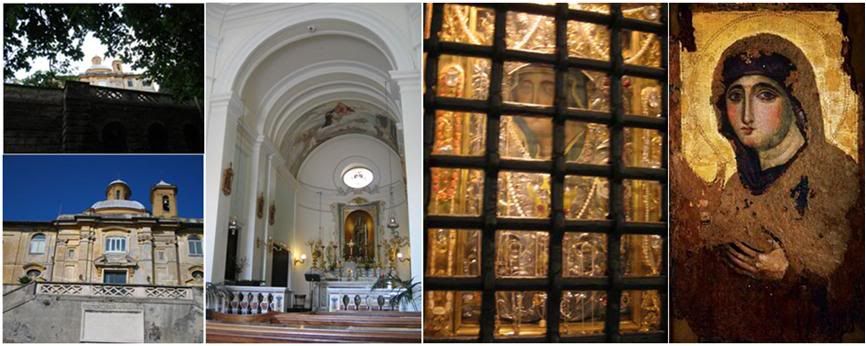 The Church of Santa Maria del Rosario. The Hagiosoritissa is found on the right side of the main altar protected by an iron grill and an incrustation of jewels.
The Church of Santa Maria del Rosario. The Hagiosoritissa is found on the right side of the main altar protected by an iron grill and an incrustation of jewels.
His visit comes a few days ahead of the "feast of the Translation" of the painting to the Monastery of SS. Dominic and Sixtus, on June 27.
This icon is considered an 'acheropita' (one that is not made by human hands. An 11th-century legend about the icon tells how the Apostles after the resurrection, decided that the face of the Virgin should be depicted by the Evangelist Luke. The artist had barely traced her face, without even putting his hand to the colours, when the image appeared complete in all its magnificent beauty, "as was natural, because the work appeared not as the result of human effort, but as an expression of the power of God Almighty".
[NB: The image came to Rome from Constantinople after a Byzantine emperor banned icons in the 8th century and came into the hands of the Dominican nuns in 1220, who have taken it with them through their various churches until Benedict XIII gave them the 17th century church of Santa Maria on Monte Mario in 1710.

Santa Maria and its location in Monte Mario, 1841 prints.
During his 10-year residence in Rome (1957-1867) Franz Liszt lived in the convent twice and composed his Christus oratorio there.]
[Modificato da TERESA BENEDETTA 25/06/2010 12:59] |
| |
 25/06/2010 14:06 25/06/2010 14:06 |
|
| | | OFFLINE | | Post: 20.456
Post: 3.094 | Registrato il: 28/08/2005
Registrato il: 20/01/2009 | Administratore | Utente Master | |
|
 Friday, June 25, 12th Week in Ordinary Time
Blessed Jutta von Thueringen (Germany, ca 1200-1260)
Friday, June 25, 12th Week in Ordinary Time
Blessed Jutta von Thueringen (Germany, ca 1200-1260)
Widow and Mother, Secular Franciscan, Patroness of Prussia
Jutta and her husband, a noble like herself, were going to the Holy Land for a pilgrimage when he died along the way. After providing for the needs of her children (all of whom eventually joined religious orders), she divested herself of the trappings of wealth, became a lay Franciscan, and dedicated her life to caring for the sick, especially lepers, the poor, and the handicapped. In life, she was considered a saint. Towards the end of her life, she set up a hermitage among non-Christians in Kulmsee, eastern Germany where she prayed for their conversion. After her death, a cultus immediately developed around her grave in Kulmsee. [I have been unable to find any image online].
Readings for today's Mass:
www.usccb.org/nab/readings/062510.shtml
OR today.

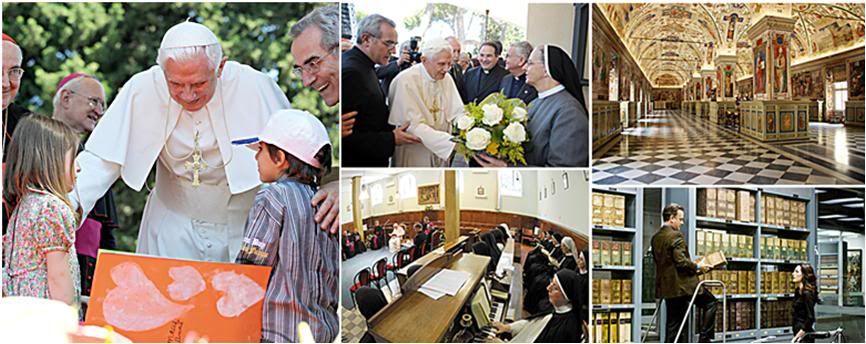
The Pope's visit to the Orione Center and the Dominican nuns of Santa Maria del Rosario
'Only charity can save the world'
The issue has coverage of the Pope's pastoral visits yesterday. Other Vatican stories are on Cardinal Tarcisio Bertone, who celebrated the Golden Jubilee of his priesthood yesterday in a Mass concelebrated in the Cathedral of Genoa with Cardinal Angelo Bagnasco; and the physical reopening in September of the Vatican Library after three years of structural renovation, during which all of its contents have also been catalogued digitally to facilitate the work of researchers. (Outside researchers were allowed to continue doing work even during the physical closure for renovation.) International news on page 1: A situationer anticipating a ruling from the European Council's Court of Human Rights on Italy's protest (joined by 10 other European nations) against a Court ruling last year prohibiting the display of the Crucifix in Italian schools; the turnover of the anti-Taliban military command in Afghanistan from General McChrystal to General Petraeus; and a UN report on the status of the Millennium Development Goals (MDG).
THE POPE'S DAY
The Holy Father met today with
- His Highness Fra Matthew Festing, Prince and Grand Master of the Sovereign Military Order of Malta,
with his delegation
- H.E. Luis París Chaverri, Ambassador from Costa Rica, on his farewell visit
- Prof. Lorenzo Ornaghi, newly re-elected Rector of the Catholic University of the Sacred Heart in Milan
- Participants at the annual meeting of ROACO, an organization that raises funds to help the Eastern-rite
Catholic Churches. Address in Italian.
The Vatican also announced that the Holy Father has named a new Bishop for Bruges (Belgium) in
Mons. Jozef De Kesel, who was Auxiliary Bishop of Mechlin-Brussels. He succeeds the former bishop
Roger Vangheluwe, until then Belgium's longest-serving bishop, who resigned two months ago because
of sexual relations years ago with a young male parishioner.
[Modificato da TERESA BENEDETTA 25/06/2010 14:50] |
| |
 25/06/2010 16:02 25/06/2010 16:02 |
|
| | | OFFLINE | | Post: 20.457
Post: 3.095 | Registrato il: 28/08/2005
Registrato il: 20/01/2009 | Administratore | Utente Master | |
|

 The first 'court of the Gentiles'
The first 'court of the Gentiles'
a la Benedict XVI to open in Paris
An idea broached by the Holy Father in his address to the Roman Curia last December,
as a place for dialog between Catholics and non-believers, it is part of the Churh\ch's
wider project for a 'new evangelization' in Europe.

ROME, June 24, 2010 – As the Italian judiciary investigates the affairs of the Congregation for the Evangelization of Peoples when it was under Cardinal Crescenzio Sepe, the Vatican is preparing to create a new dicastery dedicated to evangelization not in missionary territory, but in Western countries of ancient Christian tradition where the faith has been most weakened or has virtually disappeared.
The idea is not entirely new. After Vatican Council II, a secretariat for nonbelievers was created and lasted for a few years, entrusted to Austrian Cardinal Franz Kõnig. Now it is coming back in the more solid form of a pontifical council.
Benedict XVI has discussed it with a few cardinals, including Ruini, Scola, Bagnasco and Schoenborn. A "motu proprio" is expected to create the new council and to define its makeup and duties.
Meanwhile, however, there is already concrete action toward the goal of dialog with those 'without faith' [but in search of it], through the initiative of an older pontifical council - the Council for Culture headed by Archbishop Gianfranco Ravasi.
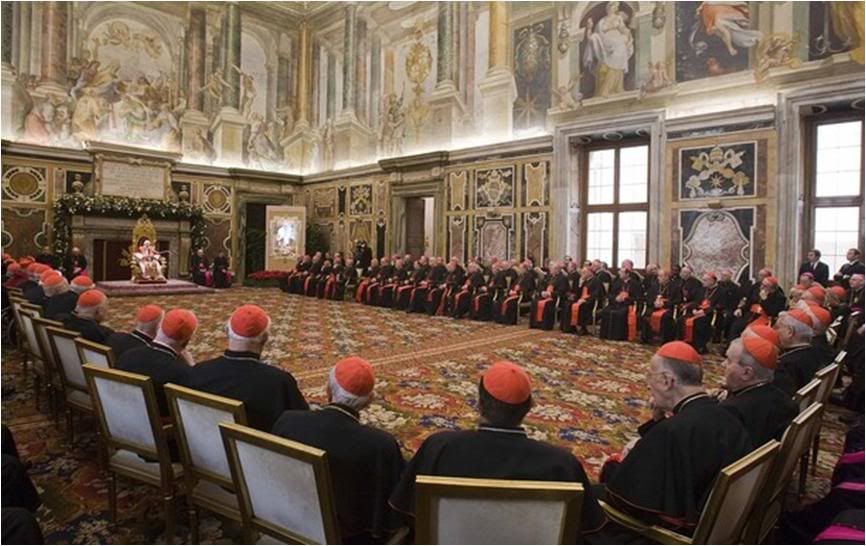
The initiative is called "Court of the Gentiles" from an idea launched by Benedict XVI, in his pre-Christmas annual speech to the Roman Curia last December 21, and its aim is to open a systematic dialogue with men who are willing to approach God "at least as Unknown."
It takes its name from the part of the Temple complex in Jerusalem to which non-Jews were allowed, and from which Jesus drove out the merchants and the money-changers.
Now that the Italian judiciary is cracking the whip against business dealings by some of the old Vatican Curia, it is even more striking to reread the words the Pope used to explain his project, last December 21:
Here, I am reminded of the words that Jesus cites from the prophet Isaiah, that the temple should be a house of prayer for all peoples (cfr Is 56,7; Mk 11,17). He was thinking of the so-called Court of the Gentiles, that he would clear of all external business so that it could be a free space for Gentiles who wished to pray to the one God, even if they could not take part in the mystery, in whose service the interior of the Temple was reserved.
A space of prayer for all peoples - this meant persons who recognized God from afar, so to speak; those who were discontented with their pagan gods, rite and myths; those who desired what is Pure and what is Great, even if God would remain for them the 'unknown God' (cfr Acts 17,23).
They should nonetheless be able to pray to the unknown God and thus be in relation with the true God, even in the midst of many obscurities.
I think that even today the Church should open a kind of 'Court of the Gentiles' where man can in some way connect themselves to God, even without knowing him, and before they can find access to his mystery, which is served by the internal life of the Church.
To the inter-religious dialog, we must now add a dialog with those for whom religion is an extraneous matter, to whom God is unknown, but who neverhteless do nto wish to remain simply without God, but to approach him even as an unknown God.
To understand better the conceppt of a "Court of the Gentiles," an appropriate exegete is certainly Archbishop Ravasi, a biblicist of worldwide fame and with a vast network of personal contacts with men of culture who are more or less removed from faith.
Ravasi published the article that follows in the June 2 issue of L'Osservatore Romano.
In it, he announces that the inaugural event of the "Court of the Gentiles" will take place in Paris in March of 2011, in three settings specifically chosen for their lack of religious affiliation: the Sorbonne, UNESCO, and the Académie Française.
The initiative has already drawn expressions of interest from numerous personalities, beginning with Julia Kristeva, a semiologist and psychoanalyst highly attentive to dialogue between believers and agnostics or atheists.
In an interview published last February 25 in Avvenire, the newspaper of the Italian bishops' conference, Ravasi described the current forms of atheism with which the Church wants to dialogue:
Attention must be paid to the different forms of atheism, which cannot be reduced to a single model.
On one side there is the great atheism of Nietzsche and Marx, which unfortunately [?] has gone into crisis, constituted by an explanation of reality different from that of the believer, but with its own ethics, a serious and courageous vision, for example, in considering man alone in the universe.
Then there is an ironic-sarcastic atheism that takes aim at marginal aspects of belief, or at fundamentalist interpretations of the Bible. This is the atheism of Onfray, Dawkins, and Hitchens.
In the third place there is an absolute indifference born of secularization, summarized well by the example that Charles Taylor gives in A secular age when he says that if God were to come to one of our cities today, the only thing that would happen would be that they would ask to see his papers."
Magister posts a translation of Ravasi's OR article on
chiesa.espresso.repubblica.it/articolo/1341494?eng=y
 Photos are from a contemporary scale model of the Temple of Jerusalem at the time of Jesus.
Photos are from a contemporary scale model of the Temple of Jerusalem at the time of Jesus.
|
| |
 25/06/2010 16:46 25/06/2010 16:46 |
|
| | | OFFLINE | | Post: 20.458
Post: 3.096 | Registrato il: 28/08/2005
Registrato il: 20/01/2009 | Administratore | Utente Master | |
|

 The Church in Belgium and the Vatican have both issued statements protesting the police raids on various sites in the Archdiocese of Malines-Brussels yesterday, purportedly as part of their investigation into sex-abuse claims. (See story posted yesterday in the CHURCH&VATICAN thread). Inexplicably, among those raided were the tombs of two Archbishops in the Cathedral of Malines (Mechelen). Because of the significance and unprecedented nature of this offense, I am posting the statements on this thread:
Statement by the
The Church in Belgium and the Vatican have both issued statements protesting the police raids on various sites in the Archdiocese of Malines-Brussels yesterday, purportedly as part of their investigation into sex-abuse claims. (See story posted yesterday in the CHURCH&VATICAN thread). Inexplicably, among those raided were the tombs of two Archbishops in the Cathedral of Malines (Mechelen). Because of the significance and unprecedented nature of this offense, I am posting the statements on this thread:
Statement by the
Belgian bishops' conference
Translated from

June 25, 2010
The bishops of Belgium were gathered at the Archbishopric of Malines-Brussels this morning, June 24, for their monthly meeting. Around 10:30, court authorities and policemen entered and informed them that they would be conducting a search of the Archdiocese in connection with charges of sexual abuses committed within the territory of the archdiocese.
No other explanation was given, but they confiscated documents and all mobile telephones, while forbidding anyone to leave the building. The search lasted until around 7:30 p.m.
Everyone was interrogated - all the bishops as well as all the personnel. It was not a pleasant experience, but everything took place correctly.
The bishops of Belgium have always said they have confidence in justice and any efforts at justice. The raid was considered in this context, and thus, for now, they will abstain from further comment.
On the other hand, the bishops, together with Professor Peter Adriaensses, president of a pastoral commission to deal with sexual abuse complaints, express regret that during a similar raid, all the files of the commission were confiscated.
This is a violation of the right to privacy of the victims/complainants who chose to present their complaints to the commission. The action is extremely harmful to the necessary work of this commission.
Eric de Beukelaer
Spokesman of the Belgian bishops' conference
Statement from the
Secretariat of State
Translated from

June 25, 2010
In publishing this Declaration, the Secretariat of State reiterates its firm condemnation of every sinful and criminal act of abuse against minors on the part of members of the Church, as well as the need to make reparation and to confront these acts according to the demands of justice and the teachings of the Gospel.
It is in the light of these needs that the Secretariat of State expresses its great concern at the manner in which some raids were carried out yesterday by Belgian authorities, and the fact that these raids also violated the tombs of Cardinals Jozef-Ernest Van Roey and Léon-Joseph Suenens, deceased Archbishops of Malines-Brussels.
In addition to the dismay at these acts, we also regret infractions against confidentiality, to which the very victims, in whose behalf the raids were conducted, are entitled to.
These sentiments were personally conveyed by Mons. Dominique Mamberti, Secretary for Relations with States, to H.E. Charles Ghislain, Ambassador of Belgium to the Holy See.
Secular disrespect for the Church, if not outright contempt, cannot be more graphically illustrated by Belgian authorities than by the action of police raiding the tombs of two cardinals! What did they think - that the Archdiocese would conceal records in those tombs? It is absurd, outrageous and totally unjustified and unjustifiable. It is also very fascistic. I cannnot even recall an analogous raid by Communist police in Eastern Europe during the Communist era!
Almost as outrageous to me is that more than 24 hours since the raids occurred, there has been no reaction so far in the Anglophone press! How difficult is it to translate French and Italian news items which were available almost immediately from yesterday?
If the offended party in this case had not been the Church, I am sure there would be tons of news reports by now denouncing the high-handedness of the Belgian police as an affront to fundamental rights, and the chattering class would have come out in force right away to denounce it.
AFP's English service has this news report today:
Police raid Catholic HQ
for sex-abuse files

BRUSSELS, 25 Jun 2010 (AFP) - Police raided Belgium's Catholic Church headquarters on Thursday and seized computer files at the home of its top cardinal over the last 20 years amid fresh accusations of child sex abuse by priests. [The accusations are not fresh at all! Like almost all the accusations reported in the past year from Ireland, Germany and other European countries, the Belgian claims date back to a decade or more.
The latest blow to the scandal-hit Roman Catholic Church came as the Vatican's ambassador to Belgium met with bishops, weeks after Pope Benedict XVI begged forgiveness from victims of paedophile priests.
A spokesperson for Brussels prosecutors said that the action, involving dozens of officers and investigators, followed a string of accusations "denouncing abuse of minors committed by a certain number of Church figures."
Armed police with dogs sealed off the palace of the archbishop of Mechelen, just north of Brussels, "in order to establish if these accusations are backed up or not," said Jean-Marc Meilleur.
A spokesperson for retired Cardinal Godfried Danneels, the man who led Belgium's Catholic Church for two decades until the turn of the year, said police confiscated a computer from the archbishop's home before he was escorted to the archdiocese.
Hundreds of submissions to a special commission set up with the backing of the church in eastern Louvain to examine complaints received of past child abuse were also taken by officers in a related swoop.
Belgian media said these were supposed to have been passed over "discreetly" to justice officials, but child psychiatrist Peter Adriaenssens, who heads up the commission, railed against the move at a press conference.
He told TV cameras indignantly: "What am I supposed to say to someone who gave me information expecting discretion?"
However, police, who did not formally interview any officials [That's at variance with the bishops' statement above] returned to the archdiocese with two more trucks early evening to cart off further material for forensics to comb through seeking hard evidence.
The Roman Catholic Church in Belgium has endured some of the worst of the worldwide paedophilia scandal to beset the Vatican, having been rocked in April when its longest-serving bishop, 73-year-old Roger Vangheluwe, resigned from his Bruges post after admitting sexually abusing a boy for years.
According to retired priest Dik Deville, hundreds of cases of sexual abuse had been signalled to Danneels going back to the 1990s, but Danneels himself recently denied being involved in any cover-up. [One has to wonder what Deville's game is, especially as he implicates Cardinal Danneels, who was long reputed to be one of the Church's most liberal bishops.]
"I cannot recall such a conversation and it would astonish me if I had paid no attention to such a message or had forgotten it," the former Belgian primate insisted.
A victim of a paedophile priest in French-speaking Wallonia has also accused Danneels'a successor as the leader of Belgium's Catholics, Andre-Joseph Leonard, of covering up an abuser and keeping him for five years at his post. [I don't think this was prominently reported before!]
"We did as much as we could at the time, removing the priest involved from all of the pastoral functions that would have put him in contact with children," Leonard's spokesperson Eric De Beukelaer recently maintained.
In a bid to restore confidence within an increasingly sceptical flock, Belgium's bishops came together in May to publicly beg forgiveness from victims both for the actions of paedophile priests and for the Church's "silence" down the years.
And the usual MSM blather...
Paedophile priest scandals and allegations of high-level cover-ups have surged again since last year across Europe, the United States and Brazil.
Earlier this month, Pope Benedict, who has met with abuse victims in Australia, the United States and Malta, issued his clearest apology yet amid the debilitating flood of complaints.
"We... insistently beg forgiveness from God and from the persons involved, while promising to do everything possible to ensure that such abuse will never occur again," he said.
The Pope himself has faced allegations that, as archbishop of Munich and later as the Vatican's chief morals enforcer, he helped to protect predator priests.
Belgian primate protests
violation of bishops' tombs

Brussels, June 25 (Translated from ASCA-AFP) - The Primate of Belgium, Mons. Andre-Joseph Leonard, has criticized the raids carried out by the police yesterday on various properties of the Archdiocese of Malines-Brussels in connection with investigations of sexual abuse complaints presented against some Belgian priests.
"Justice has a right to make these raids. But what has stunned us is that the police also searched the tombs of two archbishops and that all the Belgian bishops were detained till the evening," Mons. Leonard said.
 Center photo shows police standing guard outside the Archbishop's Palace in Malines yesterday. Right photo shows Mons De Kesel (left) with Mons. Leonard.
Center photo shows police standing guard outside the Archbishop's Palace in Malines yesterday. Right photo shows Mons De Kesel (left) with Mons. Leonard.
He spoke of unwarranted 'sequestration' and of 'excessive zeal' in connection with the police raids, at a news conference to present the new Bishop of Bruges, Mons. Jozef De Kesel, who was named by Pope Benedict XVI to succeed Roger Vangheluwe, who resigned two months ago after admitting to sexual misconduct with a young male parishioner.
The police entered the Archbishop's Palace in Malines (Mechelen) north of Brussels yesterday morning during a meeting of the Belgian bishops conference in the presence of the Apostolic Nuncio to Belgium.
The police seized files they believed to contain, among others, letters exchanged between victims and Church authorities. They also confiscated the mobile telephones of the bishops, whom they detained in the residence until they finished goind through the diocesan files and archives almost 10 hours later.
The files included those accumulated under Cardinal Godfried Danneels, who retired last year after 20 years as Primate of Belgium, and who was accused recently of covering up for an offending bishop.
The police apparently used pneumatic drills to open up the tombs of two cardinals buried in the crypt of the Cathedral of St. Rombout (Rumbold) in Mechelen, looking for hidden files, but found none. [DUH!!!]
![[SM=g8431]](https://im0.freeforumzone.it/up/0/31/3760226.gif) ![[SM=g8431]](https://im0.freeforumzone.it/up/0/31/3760226.gif) ![[SM=g8431]](https://im0.freeforumzone.it/up/0/31/3760226.gif) ![[SM=g8431]](https://im0.freeforumzone.it/up/0/31/3760226.gif) ![[SM=g8431]](https://im0.freeforumzone.it/up/0/31/3760226.gif) ![[SM=g8431]](https://im0.freeforumzone.it/up/0/31/3760226.gif) ![[SM=g8431]](https://im0.freeforumzone.it/up/0/31/3760226.gif) ![[SM=g8431]](https://im0.freeforumzone.it/up/0/31/3760226.gif) ![[SM=g8431]](https://im0.freeforumzone.it/up/0/31/3760226.gif) ![[SM=g8431]](https://im0.freeforumzone.it/up/0/31/3760226.gif) ![[SM=g8431]](https://im0.freeforumzone.it/up/0/31/3760226.gif) ![[SM=g8431]](https://im0.freeforumzone.it/up/0/31/3760226.gif) ![[SM=g8431]](https://im0.freeforumzone.it/up/0/31/3760226.gif) ![[SM=g8431]](https://im0.freeforumzone.it/up/0/31/3760226.gif) ![[SM=g8431]](https://im0.freeforumzone.it/up/0/31/3760226.gif) ![[SM=g8431]](https://im0.freeforumzone.it/up/0/31/3760226.gif) ![[SM=g8431]](https://im0.freeforumzone.it/up/0/31/3760226.gif) ![[SM=g8431]](https://im0.freeforumzone.it/up/0/31/3760226.gif) ![[SM=g8431]](https://im0.freeforumzone.it/up/0/31/3760226.gif) ![[SM=g8431]](https://im0.freeforumzone.it/up/0/31/3760226.gif) ![[SM=g8431]](https://im0.freeforumzone.it/up/0/31/3760226.gif) ![[SM=g8431]](https://im0.freeforumzone.it/up/0/31/3760226.gif) ![[SM=g8431]](https://im0.freeforumzone.it/up/0/31/3760226.gif) ![[SM=g8431]](https://im0.freeforumzone.it/up/0/31/3760226.gif) ![[SM=g8431]](https://im0.freeforumzone.it/up/0/31/3760226.gif) ![[SM=g8431]](https://im0.freeforumzone.it/up/0/31/3760226.gif) ![[SM=g8431]](https://im0.freeforumzone.it/up/0/31/3760226.gif) ![[SM=g8431]](https://im0.freeforumzone.it/up/0/31/3760226.gif) ![[SM=g8431]](https://im0.freeforumzone.it/up/0/31/3760226.gif) 'Spiegel' telling it
'Spiegel' telling it
like it is, for a change?
The German news agency

reports a surprising story - to say the least - in the 6/21/10 issue of DER SPIEGEL, which points out that one of the most important items on the agenda of the 1968 counter-culture movement was 'sexual liberation of children' which shattered previous taboos and went beyond 'boundaries of shame' to create a climate that encouraged pedophilia.
"It has fallen into oblivion, but it was precisely the '68ers and their followers who were gripped by an obsession regarding child sexuality. But now they all seem to have an acute case of forgetfulness".
That is, of course, a self-evident conclusion that people who lived through 1968 and its aftermath, as well as serious students of history, know all too well. It was a climate that led weak-willed, poorly motivated and vocationally unfit priests to indulge their sexual urges, wrongly encouraged as well by the prevailing false interpretation of Vatican II as a blanket pretext to adopt the ways of the secular world.
And it is a fact that has been well established in some of the best US studies to account for the 'boom' in priestly misconduct against minors in the 1960s-1980s.
The article cites 'culprits' such as Daniel Cohn-Bendit - perhaps the most emblematic figure of the 1968 cultural revlution - who urged 'free erotic expression' among children in a book about how to raise children from nursery school onwards; and the Green Movement in Germany, which during their organizational years advocated, among other things, 'joyful' sexual relations between children and adults.
This all makes the sanctimony of the MSM - many of them 68ers themselves or spiritual children of 1968 - all the more sickening. Of course, none of the above excuses the offenses committed by priests, but it explains why the offenses peaked in the first two decades of the Sexual Revolution.
[Modificato da TERESA BENEDETTA 26/06/2010 03:24] |
| |
 25/06/2010 18:56 25/06/2010 18:56 |
|
| | | OFFLINE | | Post: 20.459
Post: 3.097 | Registrato il: 28/08/2005
Registrato il: 20/01/2009 | Administratore | Utente Master | |
|
 Church defends decision
Church defends decision
to move Pope's Mass to Birmingham

Jun 25 2010
The Catholic Church has defended its decision to move the venue of a beatification ceremony from Coventry to Birmingham when the Pope visits the UK this autumn.
Pope Benedict XVI was scheduled to hold the open-air Mass at Coventry Airport, but the service will instead take place at Cofton Park in wouth Birmingham, which has a capacity of up to 80,000.
It is thought that the airport site could hold around 150,000, but a Catholic Church spokesman said the new venue had been selected because of its "historical resonance" and close association with Cardinal John Henry Newman, the 19th century clergyman and Catholic convert who will be beatified on the final day of the papal visit.
Alexander des Forges, spokesman for the Catholic Church, said: "As a Church we have asked Birmingham City Council for Cofton Park to be the venue for the beatification of Cardinal Newman on September 19, the last day of the Pope's visit.
"I cannot comment at all on Coventry, but I can say that a significant number of pilgrims will be able to attend the beatification at Cofton Park."
The spokesman said organisers were expecting around 80,000 pilgrims to attend the Birmingham service.
He added: "With Cofton Park you have a very close association with Cardinal Newman because it is immediately adjacent to Oratory House in Rednal, where Cardinal Newman found a place of retreat for quiet reflection. And most particularly, he was buried in Rednal Cemetery.
"Choosing Cofton Park as a venue for the beatification will also enable the Pope to pay a private pilgrimage to the rooms of Cardinal Newman at Birmingham Oratory.
"It was very much about tying into the life and death of Cardinal Newman, and the historical resonance of Cofton Park. The real key to this is the association with Cardinal Newman."
But a spokesman for Coventry City Council said the authority was "extremely surprised and disappointed" by the venue change.
He added: "While we understand the Catholic Church had specific reasons for changing the Pope's itinerary, we believe the event at Coventry Airport would have been the highlight of his visit and we're sorry that thousands of people will miss out on the opportunity to take part in what would have been a very special day."
The Pontiff's four-day trip will begin on September 16 in Scotland, where he will be received by the Queen in Edinburgh before travelling to Glasgow for an open-air Mass.
The Pope will then travel to London where he will meet the Archbishop of Canterbury Dr Rowan Williams at Lambeth Palace and pray with other church leaders at Westminster Abbey. His itinerary will also include an address at Westminster Hall in the Houses of Parliament.
One must note again that the justification' given for the venue change is lame and almost pathetic. If 'association with Cardinal Newman' had been the main criterion for choosing a site, Cofton Park would have been the first choice, to begin with, not the substitute it has now become - only because, for some reason, the Church is unable to arrange to use Coventry Airport as originally planned.
For the UK's biggest Catholic event in centuries to be 'demoted' to a secondary and much smaller location speaks poorly of the Church in England and Wales, to say the least. Is there no anonymous Catholic big-pockets out there who could contribute the few million pounds that the Church may need to get the Coventry site?
 Pope to have important meetings
Pope to have important meetings
at Catholic college in Twickenham
By Chris Wickham

25th June 2010
Pope Benedict XVI is to visit Twickenham in September.
Earlier this year the head of the Roman Catholic Church confirmed he would be coming to the UK - the first papal visit to the country since 1982.
It has been revealed he will visit St Mary’s University College on the morning of September 17.
The detailed itinerary states:
On the second day of the visit, Pope Benedict is going to St Mary's University College, Twickenham, where there will be three aspects to his visit.
The first is that he begins the day praying with representatives of religious congregations - particularly those who have a charism for education and a history of education.
He will then go and meet about 3,000 young people - schoolchildren, students - to celebrate Catholic education.
From there he will then meet with religious leaders and people of religious faith.
He will discuss with them religion and belief in our society.
The Pope is expected to stay in the Apostolic Nunciature in Wimbledon Village, home of his representative in Britain, Archbishop Faustino Sainz Muñoz, when he visits.
It was also used by Pope John Paul II during his visit almost 30 years ago.
[St. Mary's University College was founded in 1850 by the Catholic Poor Schools Committee to meet the need for teachers to provide an education for the growing numbers of poor Catholic children. Since 1975, it has expanded its offerings beyond teacher education and it now offers college degrees as a College of the University of Surrey. Its main campus is in Twickenham, a large suburban town about 10 miles southwest of central London.]
Pope will speak to
thousands of pupils
By Anna Arco

25 June 2010
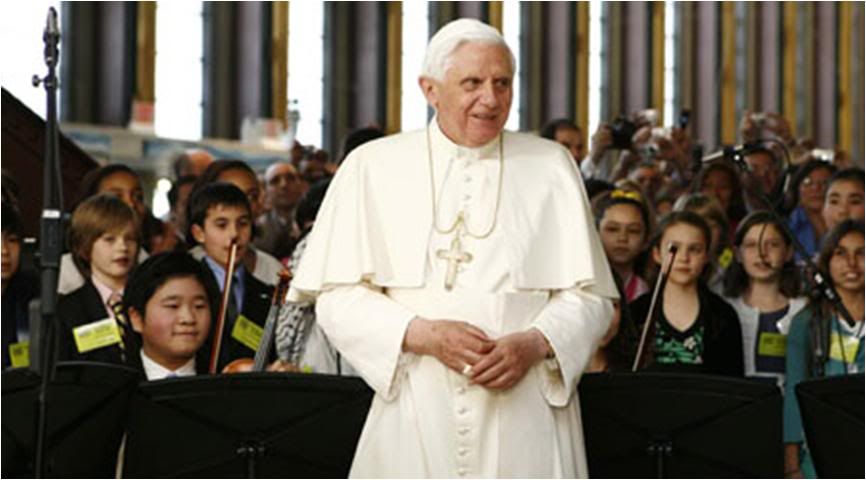 The Pope with children from the UN International School at the UN in April 2008.
The Pope with children from the UN International School at the UN in April 2008.
Pope Benedict XVI will address thousands of school children during his visit to Britain in the autumn.
During an event at St Mary’s University College, Twickenham, near London, Pope Benedict will speak to around 3,000 primary and secondary school children from around the country.
Called the “Big Assembly”, the event is due to take place at the racetrack on the campus, and pupils from across Britain will take part.
One plan for the event includes the suggestion that Pope Benedict would bless all the schoolchildren in Britain for the start of the academic year, broadcast to schools via interactive whiteboards.
Places for schoolchildren to take part in the events will be allocated to the dioceses, which in turn hand them out to schools. The Catholic Education Service (CES) has launched a blog called “link in the chain” after a meditation by Cardinal John Henry Newman. The blog carries news updates about the Big Assembly and PowerPoint presentations about the papal visit to be shown in schools.
Mgr Andrew Summersgill, the coordinator for the papal visit, said: “Yes, we are planning a gathering with schools to take place on the Friday morning of the visit. And the Catholic Education Service, both in England and Wales and in Scotland, is now in touch with schools authorities in the dioceses to seek representatives from the dioceses to come to be with Pope Benedict.
“There are about 800,000 young people in Catholic schools throughout the country. Now clearly they can’t all be in the one place. So somewhere in the region of about 3,000 young people will be invited to come along to represent their schools and their fellow pupils and to celebrate education, and particularly Catholic education, with Pope Benedict when he is here.”
Students from Holy Rosary and St Anne’s Catholic Primary School from Leeds and Maria Fidelis Convent School from north London are expected to sing at the event.
Kathryn Carter, the headteacher at Holy Rosary and St Anne’s in Chapeltown, Leeds, said: “We are absolutely ecstatic. It’s such an honour.”
The primary school, which is in one of the most deprived parts of Leeds, learned that its choir would be going to the Twickenham event just after the spring bank holiday. Oona Stannard, the director of the CES, went up to Leeds to hear the children sing soon after they were invited to take part in the event.
Mrs Carter said: “The children are over the moon. It’s a chance of a lifetime for them and they’ve put a lot of hard work into the choir and their reputation as a choir is beginning to grow. We are hoping to make this school the Leeds Cathedral choir school. We are due to become the first state choir school in Britain and so the children have been working very hard. But this is the pinnacle of their work.”
But Mrs Carter also said that she was worried about whether she would be able to raise the £5,000 to take the choir, which consists of 50 children, to Twickenham for the event. She said that most of the children at the school come from the 10 per cent most deprived areas in Britain and that she would need to raise a lot of money to transport them. The sum covers transport costs and two nights accommodation.
“If anyone would like to send cheques, make them out to Holy Rosary and St Anne’s School Fund,” she said. Maria Fidelis Convent School in Camden, a secondary girls school, won the BBC Songs of Praise School Choir of the Year competition recently.
Cardinal John Henry Newman “will feature prominently in ‘the Big Assembly’”, according to the blog. The organisers have linked the event to the beatification by focusing on Newman’s “importance in education”.
The first principal of St Mary’s College was an Oratorian like Newman. Beginning as a Catholic teacher-training college in 1850, St Mary’s educated teachers to sense the growing numbers of poor Catholic children in need of schooling.
By 1899 the Vincentians took over the college. In 2006 it was given the status of a university college. Sources close to St Mary’s said they were delighted about the papal visit.
They have great expectations for the event because St Mary’s has “gone from strength to strength, having gained the university college title three years ago and is continuing the campaign to become the first Catholic university in this country”.
Vatican has reportedly
turned down BBC offer
by Tim Walker

26 Jun 2010
So keen was Mark Thompson, the BBC's director-general, for Pope Benedict XVI to appear on Radio 4's Thought for the Day that he made a personal approach to the Vatican.
Sadly, Mandrake hears that the efforts of the Jesuit-educated Roman Catholic have come to naught.
"The Pope has not taken up the corporation's offer," announces The Tablet, whose editor, Catherine Pepinster, is a regular contributor to the three-minute religious slot on the Today programme.
Thompson had hoped to time the broadcast to coincide with the Pontiff's visit in September.
Mark Damazer, the Radio 4 controller, left the negotiations to his boss. He said: "I think Mark Thompson is better qualified than me on two grounds: being director-general, and his religion."
The slot is pre-recorded, meaning that the Pope would not have had to make an early morning visit to the Today studios. It is open to speakers of all faiths. The Archbishop of Canterbury delivers a message at least once a year.
[Modificato da TERESA BENEDETTA 26/06/2010 14:24] |
| |
 25/06/2010 23:00 25/06/2010 23:00 |
|
| | | OFFLINE | | Post: 20.460
Post: 3.098 | Registrato il: 28/08/2005
Registrato il: 20/01/2009 | Administratore | Utente Master | |
|
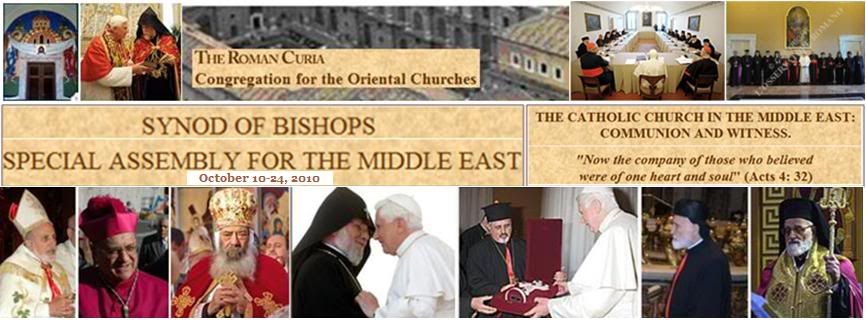 Pope pays tribute to
Pope pays tribute to
Middle East Christians

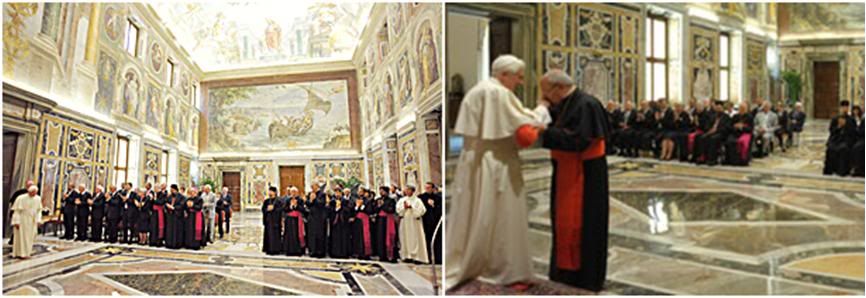
25 Jun 10 (RV) - On Friday Pope Benedict XVI received members of ROACO (Reunion of Aid Agencies for the Oriental Churches), at the end of their plenary session.
ROACO, which is under the Congregation for Oriental Churches, coordinates nearly 20 U.S. and European agencies and organizations that provide assistance to Eastern Catholic communities in Asia, Northern Africa, Eastern Europe and the Middle East.
With the coming October Synod of Bishops for the Churches in the Middle East firmly on his mind, Pope Benedict renewed his appeal for a stable peace and religious freedom in the region.
The Holy Father delivered his address in Italian, French, German and English. I have replaced Vatican Radio's translated excerpts with a translation of the full text:
Dear cardinals,
Venerated brothers in the episcopate and the priesthood,
Dear members and friends of ROACO:
I welcome you with joy for the summer session of the Riunione delle Opere in Aiuto alle Chiese Orientali (ROACO), and I give heartfelt thanks to Cardinal Leonardo Sandri, Prefect of the Congregation for Oriental Churches, for the greeting he addressed to me. I return the greeting with a prayer to the Lord, and extend it to the Archbishop Secretary, the Undersecretary and the other co-workers in the dicastery, with a cordial thought for the Pontifical Representative in Jerusalem, Israel and Palestine, for the Maronite Archbishop of Cyprus, and the Father Custodian of the Holy Land who are meeting here with representatives of international Catholic agencies and of Bethlehem University.
I express to all my gratitude and that of the Church, particularly the pastors and the Orneital-rite and Latin faithful of the terrotories under the Congregation for Eastern Churches aw well as those who have left their homelands.
He continued in French:
We all wish for the Holy Land, Iraq and the Middle East the gift of a stable peace and solid coexistence. These are born from respect for the rights of the individual, of families, of communities and peoples, going beyond all religious, cultural or social discrimination.
I entrust to God, but also to you, the appeal launched in Cyprus in behalf of the Christian Orient. As instruments of ecclesial charity, may you be able to work together even more in order to establish justice in freedom and peace.
I encourage our brothers and sisters who, in the East, share the inestimable gift of Baptism, to persevere in the faith, and, despite the numerous sacrifices, to remain there where they were born.
At the same time, I call on Oriental migrants not to forget their origins, particularly the religious. Their faithfulness and their human and Christian consistency depends on that. I wish to pay particular homage to the Christians who are suffering because of the Gospel, and I entrust them to the Lord.
I continue to count on the responsible national authorities to guarantee in a real manner - everywhere and without distinction - the public and communitarian profession of religious convictions by everyone.
Last year, on this occasion and in view of the Year for Priests, I asked for particular attention to be paid to the ministers of Christ and the Church. Abundant fruits of holiness have come forth not just for priests but for all the People of God.
Let us ask the Holy Spirit to confirm the signs of divine benevolence through the gift of vocations, of which the ecclesial community, in the West as in the East, are very much in need.
In German, he said:
I am glad to learn that the Catholic Churches in the Orient have zealously promoted the objectives of the Year for Priests and that the assistance of ROACO has helped to support them even in this area.
You have been concerned not just with the formation of candidates for Holy Orders which remains a priority, but also the needs of the clergy who are engaged in pastoral work, as, for instance, their continuing spiritual and cultural education, and help for priests who are in difficult but still fruitful conditions of illness and age.
In this way, you contribute to allow their priceless and indispensable gift of priestly service to shine forth. In antiquity, the Orient was the home of great schools of priestly spiritualty. The Church of Antioch, to cite just one example, has produced extraordinary saints: highly learned priests who did not place themselves in the foreground but rather, Christ and the Apostles. They dedicated themselves wholly to announcing the Word and the celebration of the divine mysteries. They were able to touch men in their consciences and enrich them where they could not have done so themselves with purely human means.
Dear friends, contribute above all through your engagement so that the priests of the Eastern Churches in our time can continue to reflect this spiritual heritage. This will get a great push through the network of schools and social institutions that is rightly your concern in that this will allow them a solid pastoral background.
When priests have genuine spiritual motivations in carrying out their service, they also strengthen lay people in their commitment to carry out their Christian calling alongside their temporal concerns.
In English, he said:
We now have the common task of preparing for the Special Assembly for the Middle East of the Synod of Bishops. I thank God for this initiative, which is already producing the beneficial fruits of "communion and witness" for which the synod was initially convoked.
Last year at Castel Gandolfo, I had the pleasure of announcing this Synodal Assembly during a meeting of fraternal prayer and reflection with the Patriarchs and Major Archbishops of the Eastern Churches.
During my recent visit to Cyprus, which I recall with much gratitude to God and to those who welcomed me, I consigned the Instrumentum Laboris of this Special Assembly to representatives of the Episcopate of the Middle East.
I am pleased at the broad cooperation provided thus far by the Eastern Churches and for the work which, from the beginning, R.O.A.C.O. has done, and continues to do for this historical event.
This joint effort will have fruitful results because of the presence of some of your representatives at this episcopal gathering and your ongoing relationship with the Congregation for the Eastern Churches.
He concluded in Italian:
Dear friends, I ask you to contribute with your work to keep alive 'the hope that does not disappoint' among the Christians of the Orient (Rm 5,5; cfr Instrumentum laboris, Conclusioni).
In the 'little flock' (Lk 12, 32) that they constitute, already the future of God is operative, and the 'narrow way' that they are going through is described in the Gospel as 'the way to life' (Mt 7,13-14). We must always be at their side!
Confident in the intercession of the Most Blessed Mother of God and of the holy Apostles Peter and Paul, I entrust to the Lord the benefactors, friends and co-workers, living and deceased, who have been linked in various ways to ROACO, with a particular thought for Mons. (Luigi) Padovese, who died recently, while I impart to each of you, your member organizations, and the supporters of international agencies, as well as all the beloved Eastern Catholic Churches, a comforting Apostilic Blessing.
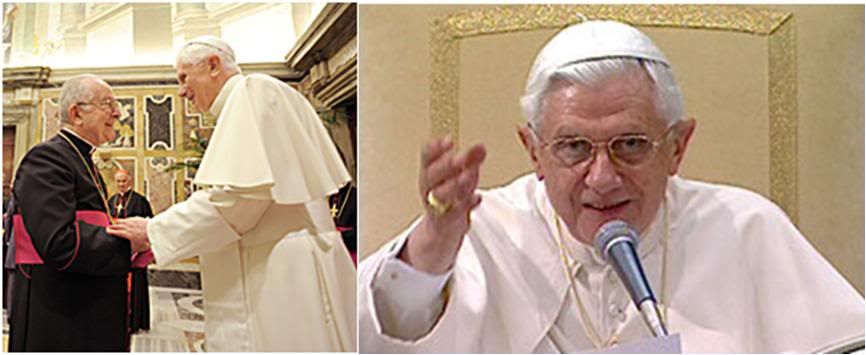 No glory for little-known agency
No glory for little-known agency
that funds the Eastern churches
By Carol Glatz

VATICAN CITY, June 25 (CNS) -- When the Vatican agency that coordinates funding to Eastern Catholic churches -- more often called by its Italian acronym, ROACO -- hired a Belgian priest to head its office, the first thing he said was "What is ROACO?"
Father Leo Lemmens said that when he was asked earlier this year to be the organization's secretary, he never had been aware of its existence.
Hardly a household name, ROACO is much like the backstage manager of a big Broadway show: far from the limelight, ROACO coordinates the roles of numerous Catholic aid agencies on the world stage and gets little glory when things go without a hitch.
Created by the Vatican's Congregation for Eastern Churches, ROACO coordinates nearly 20 U.S. and European agencies and organizations that provide assistance to Eastern Catholic communities in Asia, Northern Africa, Eastern Europe and the Middle East.
Coordinating the vast amounts of aid and the projects to be funded is key if the church and its donors want to avoid doubling efforts.
Such was the case in Iraq.
Donor agencies last year were eager to contribute humanitarian aid to the country. But ROACO told members that the Caritas Internationalis network was successfully providing the needed emergency assistance.
Instead, further donor help was needed in providing pastoral care to help strengthen the local churches in Iraq especially after several church buildings had been the targets of bombings in 2004.
ROACO also acts as sort of clearinghouse, taking in requests for aid and support from the Eastern churches all over the world. Eastern Catholic churches are often a minority in overwhelmingly Muslim or Orthodox Christian nations and are located sometimes in very poor countries.
At its annual meeting June 20-24 at the Vatican, ROACO alerted its members to the urgent requests for help coming in from Eritrea -- a country on the horn of Africa.
"The institutions of the Catholic Church there: the charity houses, the schools, hospitals, and clinics are risking collapse" if they do not receive needed aid, Father Lemmens told Catholic News Service.
Eritrea is "the fifth poorest country in the world and yet it is among the five countries of the world receiving the least help," he said.
Though funding remains "a huge problem," Father Lemmens said ROACO helped assign which member donor agencies would take on projects there that needed assistance.
ROACO also acts as a bridge linking the Holy See and Christians of the Latin tradition to those of the Eastern Catholic churches. The Eastern churches have their own distinctive liturgical and legal systems, but enjoy the same dignity, rights, and obligations as members of the Latin rite.
In his June 23 address to ROACO members, Pope Benedict XVI praised the organization for its work in helping "brothers and sisters in difficulty" and in "making visible the charity that binds Christians" of the Latin and Eastern traditions.
"To strengthen such ties is to offer a very precious service to the universal church," he said.
Moreover, in a world in which individualism seems to reign, the pope said Christians need to show "solidarity that crosses all frontiers."
Though ROACO addresses the needs of the Eastern churches across three continents, it also comes to the aid of the Latin-rite communities in the Middle East, particularly the Holy Land.
In order to better assess how they can help the Christian communities there, ROACO invited Archbishop Antonio Franco, the Vatican's representative to Israel and the Palestinian territories, and Franciscan Father Pierbattista Pizzaballa, custodian of the Holy Land, to tell donor agencies about the current situation.
Father Pizzaballa told CNS that "unfortunately the political and social situation remains unstable for Christians" with many continuing to emigrate abroad.
Pope Benedict said there have been "some positive signs" seen recently that have strengthened "our hope that the day of reconciliation" between Israelis and Palestinians "will not be long in coming."
Father Pizzaballa, however, said Israel's continued construction of a security barrier was a symbolic sign of stalemate.
"The wall is a strong, visible reality that is a symbol of the actual situation (in the Holy Land) of no dialogue between the parties," Father Pizzaballa said.
He urged ROACO members to keep investing in schools and training teachers "because the future for Christian communities passes through the schools."
He also said the number of foreign tourists coming to the Holy Land on pilgrimage was on the rise. He said the visits not only help stoke the local economy, they also give a "human and psychological" boost to Christians, Jews and Muslims.
"Because if they see the city is full of life, this helps" bring a greater sense of normalcy to the lives of local residents, he said.

[Modificato da TERESA BENEDETTA 27/06/2010 15:14] |
| |
 26/06/2010 01:08 26/06/2010 01:08 |
|
| | | OFFLINE | | Post: 20.461
Post: 3.099 | Registrato il: 28/08/2005
Registrato il: 20/01/2009 | Administratore | Utente Master | |
|
 I don't know how much credence to give to this story in terms of what it says about an 'ambitiously massive universal publication' planned in one fell swoop. I understood from the original announcement from the Vatican that the German edition published by Herder and the Italian edition published by the Vatican would come out first, but that "copies in major languages, including English, will require a few months to be completed, given the time necessary for an accurate translation of such an important and long-awaited text".
'Absolute secrecy' about
I don't know how much credence to give to this story in terms of what it says about an 'ambitiously massive universal publication' planned in one fell swoop. I understood from the original announcement from the Vatican that the German edition published by Herder and the Italian edition published by the Vatican would come out first, but that "copies in major languages, including English, will require a few months to be completed, given the time necessary for an accurate translation of such an important and long-awaited text".
'Absolute secrecy' about
the Pope's new book
by Lo Svizzero
Adapted and translated from

June 25, 2010
It is as if the old rules regarding the duty of absolute secrecy have been exhumed. Not a word has leaked from behind the Bronze Door about the contents of the most recent literary and theological undertaking of Joseph Ratzinger/Benedict XVI.
We know he has finished the work, the second volume of JESUS OF NAZARETH. The manuscript was delivered by his private secretary to the director of the Vatican publishing house himself, who would then turn it over to translators who would likewise be sworn to absolute secrecy.
Translation presents a major difficulty, because the Pope, understandably, wants to make sure that the translations faithfully reflect his original manuscript in German. Additionally, he is said to want the translation done in as many languages possible.
One gathers that it would be a sort of catechesis about Jesus for the third millennium. Little is known about how it would compare with Volume I (which covered the public ministry of Jesus).
[When Vol. 1 was published in 2007, the Pope said that Volume II would dwell on the Passion and Resurrection of Jesus, but also about his infancy, about which little has been written. However, at least two reports in the Italian media recently speculate that the Pope would write about the young Jesus in a third volume.]
Because of the translation difficulties and in view of the ambitious universal publication planned, it may not in fact come out until Easter of 2011, by some calculations.
Publication in such a 'massive' way of Benedict XVI's second Christologic work in the third millennium comes at a difficult time for the Church.
But Vatican sources are hopeful that the book could mark a turning point - one capable of working its own miracle of faith in a world inhabited by more and more people of little or no faith. [Though these 'sources' are expressing hope not fact, such statements do not really go with 'absolute secrecy', do they?]
In a way, it is hoped that the book will constitute a great 'sign' awaited almost as much as the ancient world awaited miracles from the great hermits of their time.
Will Joseph Ratzinger/Benedict XVI meet these expectations?
[I really find this kind of hype about the Pope's book completely unnecessary and disconcerting! He will manage to surprise everyone, as usual. So let's sit back and wait for it!]
[Modificato da TERESA BENEDETTA 26/06/2010 01:11] |
| |
 26/06/2010 02:28 26/06/2010 02:28 |
|
| | | OFFLINE | | Post: 20.462
Post: 3.100 | Registrato il: 28/08/2005
Registrato il: 20/01/2009 | Administratore | Utente Master | |
|
 Pope meets Grand Master
Pope meets Grand Master
of the Knights of Malta

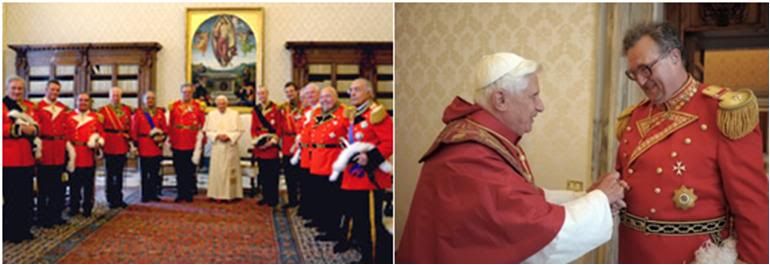 Left photo taken Friday, from Vatican Radio; right photo, Festing received by the Pope in June 2008 shortly after he was elected Grand Master.
Left photo taken Friday, from Vatican Radio; right photo, Festing received by the Pope in June 2008 shortly after he was elected Grand Master.
(25 Jun 10 – RV) On Friday Pope Benedict XVI received the Grand Master of the Order of Malta, Fra Mathew Festing, in private audience.
The Sovereign Military Hospitaller Order of St. John of Jerusalem of Rhodes and of Malta, better known as the Sovereign Order of Malta, is one of the most ancient Catholic Religious Orders, founded in Jerusalem in around 1048.
The Order's mission is summed up in its motto "Tuitio Fidei et Obsequium Pauperum" - defence of the faith and assistance to the suffering.
We spoke to Fra Festing about living this charism in today’s world:
Both in Jerusalem and in Rhodes and on Cyprus and on Malta itself, and indeed ever since, we have always cared for the sick. It’s partly an extension of what we did for pilgrims going to Jerusalem all those centuries ago.
Now we have branches of the order in over 46 countries. We have a huge amount going on in very nearly every country in the world.
I would divide what we do into three parts; day-to-day in developed countries, we have a constant every day presence, it maybe looking after drug addicts, or elderly people, some of it is working in hospitals.
Then in addition to that we have in a lot of ongoing projects in developing countries, which may be looking after people with leprosy, people suffering from TB, which is on the increase again, and general medical and social care.
Then the third aspect is disaster response, sometimes they are man-made, as in war, sometimes they are natural such as the recent Haiti earthquake.

|
| |
 26/06/2010 14:15 26/06/2010 14:15 |
|
| | | OFFLINE | | Post: 20.464
Post: 3.102 | Registrato il: 28/08/2005
Registrato il: 20/01/2009 | Administratore | Utente Master | |
|


 Thanks to Ann for calling my attention to this delightful anecdote. I don't always check ZENIT everyday...
A true Bavarian
Thanks to Ann for calling my attention to this delightful anecdote. I don't always check ZENIT everyday...
A true Bavarian
by EDWARD PENTIN

ROME, JUNE 24, 2010 (Zenit.org).- Among Benedict XVI's many friends, those from Bavaria are most probably the ones who know him best.
One of them is Professor Hanna Barbara Gerl-Falkowitz, chair of philosophy and comparative religion at the University of Dresden, who has known the Pope since before he was made archbishop of Munich and Freising, when he was simply Professor Joseph Ratzinger.
Last month, while in Rome to take part in a conference on the Catholic philosopher Dietrich von Hildebrand, she shared with me some insights into his character. In particular, she recalled a particular amusing anecdote of when they first met.
Gerl-Falkowitz was hosting a conference for 300 people and had invited the then-Professor Ratzinger to speak on Romano Guardini, the great German Catholic intellectual whom Joseph Ratzinger has long admired.
The venue was Rothenfels Castle, high up on a mountainside near the Bavarian city of Wurzburg. "It was 1976," Gerl-Falkowitz recalls. "I remember the year exactly because he [Professor Ratzinger] became archbishop of Munich one year later.
"I had sent a helper to collect him from the train, and this man came back saying: 'There's no Professor Ratzinger, I didn't see him.' But I had a castle full of 300 people and I was pulling my hair out, running around in total despair. You need to know that the castle was situated on a steep rock-face.
"Well after about 20 minutes, I stood on the ridge and next to me was a hedge that began to move. Then, first I saw a bag, then two hands, and then the white hair -- he was already white-haired by then -- of Professor Ratzinger. He was sweating, forcing himself through the hedge. He'd climbed the very steep hill just to find the castle. I wanted to disappear into the earth! But he was very kind and very smiling. He said: 'Ascensio in montem sacrum' which means: 'To ascend the holy mountain.'
"He was hinting at Guardini because he enabled this castle to be used for German Catholic youth. That was my first encounter with Joseph Ratzinger -- his hair unkempt, paper flying around and totally out of sorts. I don't know whether he remembers it, but I do. It was terrible though -- to be invited to give a speech and there's no one to collect you!"
Gerl-Falkowitz has great admiration for the Holy Father, and continues to be amazed at his strength of character.
"He's very strong," she says. "I was always astonished that, with all that was happening around him, with all his activities, the man can pray with such an incredible concentration. It means he's really close to the Lord -- that is my impression. And he's very simple. All his intelligence is only a kind of casing around a very deep and precious simplicity.
"The first impression one always has is that he's a bit shy and that is correct, he comes from a part of Bavaria -- old Bavaria -- where people are shy. There is this type of Bavarian who is loud and likes drinking and so on -- that's the official image of the region. But in old Bavaria they are timid, shy -- they don't speak so much but are grounded, very deep and pious."
Gerl-Falkowitz says the recent crisis in the Church has caused the Holy Father to "suffer a lot" and "really knocked him down." But "he's a strong believer," she adds, and has no doubt that his strength of character and faith will see him through the storms.
[Modificato da TERESA BENEDETTA 26/06/2010 14:20] |
| |
 26/06/2010 14:41 26/06/2010 14:41 |
|
| | | OFFLINE | | Post: 20.465
Post: 3.103 | Registrato il: 28/08/2005
Registrato il: 20/01/2009 | Administratore | Utente Master | |
|
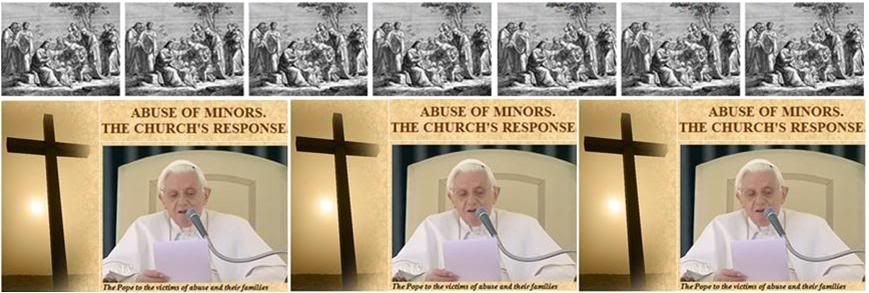 Yesterday, the online 'headlines' about the Vatican were divided between the Belgian police raid on Archdiocesan properties in the Brussels area and the actual filing of the Vatican's answer to a Kentucky lawsuit in which complainants seek to depose the Pope and other Vatican officials. I ignored the latter because they were merely repetitions of what the Vatican lawyer said weeks ago would be his response. But John Allen has writtten this more detailed account. As unpleasant as this whole headline-baiting, Vatican-big-pockets-targeted legal grandstanding is, it's there, so might as well learn something more about it...
Vatican opposes interrogation
Yesterday, the online 'headlines' about the Vatican were divided between the Belgian police raid on Archdiocesan properties in the Brussels area and the actual filing of the Vatican's answer to a Kentucky lawsuit in which complainants seek to depose the Pope and other Vatican officials. I ignored the latter because they were merely repetitions of what the Vatican lawyer said weeks ago would be his response. But John Allen has writtten this more detailed account. As unpleasant as this whole headline-baiting, Vatican-big-pockets-targeted legal grandstanding is, it's there, so might as well learn something more about it...
Vatican opposes interrogation
of Pope in sex abuse case

Jun. 25, 2010
On the same day that Belgian police raided church offices to seize documents in a sex abuse probe, the Vatican found itself in the courts of another country, this time the United States, trying to fend off attempts to interrogate the Pope and other senior Vatican officials in another case involving clerical sexual abuse.
Vatican attorneys filed a brief on Thursday in U.S. District Court in Kentucky in the case of O’Bryan v. Holy See, opposing requests from lawyers representing three sex abuse victims for depositions of four figures at the very top of the church’s power structure:
• Pope Benedict XVI
• Italian Cardinal Tarcisio Bertone, the Vatican’s Secretary of State
• American Cardinal William Levada, Prefect of the Congregation for the Doctrine of the Faith
• Italian Archbishop Pietro Sambi, the Vatican’s nuncio, or ambassador, in the United States
The requests, the Vatican lawyers argued, are “unprecedented – akin to a foreign plaintiff seeking a foreign court order compelling the depositions of the United States President, Vice President, Secretary of Defense and ambassador.”
Such a move, the brief warns, could have dangerous foreign policy implications.
If an American court allows such proceedings, Vatican lawyers state, “Foreign courts could feel emboldened to order depositions of the President or Vice President of the United States regarding, for example, such issues as CIA rendition.”
Lawyers for the victims are also seeking a wide swath of documents from the Vatican, including communications with all bishops in the United States on sexual abuse issues for the last ninety years, and any documents related to more than 3,300 American priests against whom accusations of abuse have been lodged.
California-based attorney Jeffrey Lena, who represents the Vatican in American litigation, argued on Thursday that the requests are unjustified for two reasons:
First, because the Vatican wasn’t involved in decisions on sex abuse cases in the United States, and it had no policy forcing bishops to cover up abuse; and
Second, because the Pope and other Vatican officials enjoy immunity under international law from being forced to give testimony.
Among other things, the brief is the first time that Vatican lawyers have claimed that the personal immunity enjoyed by heads of state applies not just to the Pope but also to the Vatican’s Secretary of State, on the grounds that the Secretary of State “is the equivalent of the Holy See’s Prime Minister.”
The O’Bryan case was originally filed in 2004, and is unique in that to date it’s the lone lawsuit against the Vatican to focus primarily on the role of bishops in covering up abuse rather than the priests who committed it.
A federal appeals court ruled in 2008 that the case could proceed under an exception to the Vatican’s sovereign immunity, if the plaintiffs could show that:
• American bishops who engaged in what civil law calls "negligent supervision" were acting as employees and/or agents of the Vatican;
• The bishops were following official Vatican policy, as opposed to exercising discretionary judgment.
In a request filed on March 30, attorney William McMurry argued that taking depositions of Vatican officials is necessary to illustrate “the Holy See’s extensive control over clergy in the United States” and its “policy prohibiting clergy from telling anyone about known or suspected instances of child abuse.”
McMurry cited the case of Fr. Lawrence Murphy in Wisconsin, a priest accused of abusing more than 200 deaf children from 1950 to 1974. His case was referred to the Congregation for the Doctrine of the Faith in 1996, but Murphy was not formally laicized prior to his death in 1998.
Documents in the Murphy case, McMurry stated in his March 30 filing, “unequivocally link Pope Benedict XVI, formerly Cardinal Joseph Ratzinger, to child sexual abuse cases in the United States,” proving that the Congregation for the Doctrine of the Faith on his watch “discouraged prosecution of accused clergy and encouraged secrecy to protect the reputation of the church.”
The Pope, McMurry argued, “is the most knowledgeable living person” regarding files in the Vatican and policies imposed by the Vatican on the sexual abuse crisis.
Aside from the personal immunity of the Pope and other Vatican officials, Lena’s opposition pivots on the assertion that the Vatican wasn’t involved in any decisions related to abuser-priests in the Kentucky cases, and that no Vatican policy directed bishops to cover up that abuse.
Lena points out that in a 2002-2003 lawsuit against the Archdiocese of Louisville, the same attorneys now suing the Vatican conducted 21 depositions of church officials and acquired 7,500 pages of church documents – enough, according to one of those attorneys, to occupy “91 feet of shelf space” in their offices.
Yet, Lena argues, that material has never been cited in the O’Bryan case, because it “makes clear that personnel matters related to priests – including allegations of child sexual abuse – were handled at the discretion of the local archbishop and archdiocesan personnel.”
“There is no hint of Holy See involvement with regard to any priest in the archdiocese, the evidence contradicts the notion that the archbishop was following any ‘mandatory’ Holy See policy, and the archdiocese repeatedly affirmed under oath that it never sent documents to the Holy See,” Lena’s brief states.
On the Murphy case in Wisconsin, Lena says the fact that the Vatican didn’t learn about it until twenty years after the abuse occurred “is profoundly inconsistent with the notion that the Holy See exercised day-to-day control over the handling of child sexual abuse allegations in the United States.”
Lawyers for the victims in the O’Bryan case have cited a Vatican document titled Crimen Solicitationis, first issued in 1922 and again in 1962, as a “smoking gun” proving that Rome directed bishops not to report abuse. Lena, however, says there is no evidence that the canonical procedures laid out in the document were ever followed in the Kentucky cases at issue in the O’Bryan lawsuit.
Observers say a decision on the requests for depositions is expected in November.
At present, it’s unclear what might happen if the Kentucky court were to order depositions of Vatican officials. Legal experts say that if such an order were issued and Vatican officials refused to comply, the court could assume their testimony would be damaging and decide the case on that basis.
To date, no Vatican official has been subjected to a deposition about the Vatican’s role in a sex abuse case. Levada was deposed in 2006 in an Oregon case, but that inquiry related only to his time as Archbishop of Portland from 1986 to 1995.
|
| |
 26/06/2010 17:27 26/06/2010 17:27 |
|
| | | OFFLINE | | Post: 20.467
Post: 3.105 | Registrato il: 28/08/2005
Registrato il: 20/01/2009 | Administratore | Utente Master | |
|
 Archbishop of Birmingham
Archbishop of Birmingham
welcomes site change for
Cardinal Newman's beatification Mass

June 26, 2010

The Archbishop of Birmingham has welcomed the decision to move a beatification ceremony to be conducted by the Pope to his city.
It was announced on Thursday Pope Benedict XVI will hold the service for Cardinal Newman in Birmingham instead of Coventry, as originally proposed.
Archbishop Bernard Longley said Birmingham had a historic bond with Cardinal Newman.
He said people would look forward to the event with "undimmed enthusiasm".
Coventry City Council officials said on Friday a lot of work had already gone into their planning for the visit in September.
The authority was "extremely surprised and disappointed" by the sudden change of location, a spokesman said.
But the Archbishop said: "I know that they will look forward to this beatification with undimmed enthusiasm and enter into the celebration together with pilgrims from elsewhere within and beyond our Catholic archdiocese."
The Catholic Church has asked if Cofton Park could be used for the beatification of Cardinal John Henry Newman, who was buried nearby, on 19 September.
Coventry Airport, the original location, can hold crowds of up to 150,000, while Cofton Park holds 80,000.
The Archbishop said the ceremony in the second city highlights the strong links it has with Cardinal Newman.
"Cardinal Newman lived for most of his Catholic life at the Oratory House, Edgbaston and after his death on August 11, 1890 he was buried at the Oratory Fathers' cemetery in Rednal," he said.
"The finest recognition Cardinal Newman received was from the ordinary people of Birmingham whose lives were changed because of their contact with him, and more than 15,000 people spontaneously lined his funeral route from the Oratory to Rednal as a final tribute to this holy, caring parish priest.
"The decision to locate the beatification mass at Cofton Park emphasises Cardinal Newman's long association with his adopted city."
The visit, between 16 and 19 September, is the first papal visit to the UK since that of John Paul II in 1982.
The itinerary includes a reception with the Queen at Holyrood House in Edinburgh and open air Masses in Glasgow and London.
More about this in a UK Press Association report:
Site change welcomed

June 26, 2010
The Archbishop of Birmingham has welcomed the decision for a beatification ceremony conducted by the Pope to be held in the city, despite a council's concerns that thousands might miss out because of a change of venue.
Pope Benedict XVI was scheduled to hold the open air service for Cardinal John Henry Newman during his UK visit in September at Coventry Airport, but it was decided to hold the service at Cofton Park in Birmingham instead.
Coventry City Council said it was "extremely surprised and disappointed" and the new plans would cause thousands of people to miss out on the event.
But Archbishop Bernard Longley, Archbishop of Birmingham, said he was delighted to welcome the pontiff and he was sure those involved would look on the visit with "undimmed enthusiasm".
The Archbishop said the decision to hold the beatification of the revered 19th century clergyman and Catholic convert in Birmingham emphasised his "long association" with the city.
He said: "Cardinal Newman lived for most of his Catholic life at the Oratory House, Edgbaston and after his death on August 11, 1890 he was buried at the Oratory Fathers' cemetery in Rednal.
"The finest recognition Cardinal Newman received was from the ordinary people of Birmingham whose lives were changed because of their contact with him, and more than 15,000 people spontaneously lined his funeral route from the Oratory to Rednal as a final tribute to this holy, caring parish priest.
"The decision to locate the beatification mass at Cofton Park emphasises Cardinal Newman's long association with his adopted city."
He said he was "mindful" of the Catholic parishes and people of Coventry who had been preparing for the service and acknowledged the preparation work of the local team.
"I know that they will look forward to this beatification with undimmed enthusiasm and enter into the celebration together with pilgrims from elsewhere within and beyond our Catholic archdiocese," he added.
[Modificato da TERESA BENEDETTA 27/06/2010 19:06] |
| |
|
|
|
|